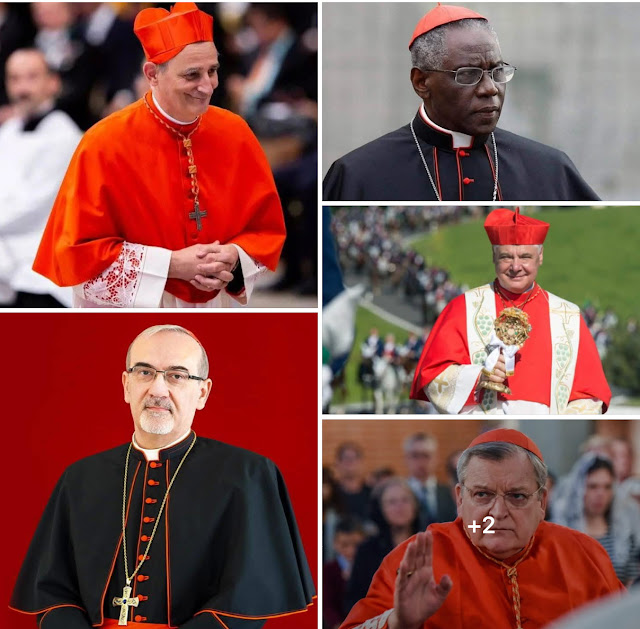Certainly, it is difficult to make the demands of the Gospel understandable to secularized people. But this pastoral difficulty must not lead to compromises with the truth.
Distinction Matter - Subscribed Feeds
-
Site: Fr. Z's BlogRoman Station: St. Paul’s outside-the-walls Scott Hahn reflects on the Heavenly liturgy as related in the Book of Revelation and how it teaches us to worship. We also hear what my home parish sounded like on Easter Sunday and why … Read More →
-
Site: Crisis Magazine

Not even months into his new pontificate, Pope Francis declared, to a group of young people in Paraguay, “Go out and make a mess.” A puzzling remark from the Successor of St. Peter. As the years of his papacy went on, we witnessed what he meant. Year after year, he kept his promise. And the Church descended into an unprecedented chaos. Recall St. Augustine’s classic definition of peace: the…
-
Site: Crisis Magazine

In the Gospel for Easter Sunday, we have St. John’s account of the two apostles, Peter and John, discovering the tomb empty. The evangelist records how John, the younger of the two, outran Peter and arrived first at the sepulcher. But the younger apostle deferred to Peter and allowed him to enter first. John followed, and the evangelist remarks of him that he saw and believed (John 20:8).
-
Site: LES FEMMES - THE TRUTH
-
Site: Catholic Herald
President Donald Trump has ordered that flags at federal, state and military buildings be lowered to the half-mast position – referred to as “half-staff” in the US – in honour of Pope Francis who died on Monday at the age of 88.
The 47th US president also announced that he and his wife will attend the funeral of Pope Francis in Rome. US flags shall remain lowered until the Pope’s funeral, according to the executive order.
“As a mark of respect for the memory of His Holiness Pope Francis, by the authority vested in me as President of the United States by the Constitution and the laws of the United States of America, I hereby order that the flag of the United States shall be flown at half-staff at the White House and upon all public buildings and grounds, at all military posts and naval stations, and on all naval vessels of the Federal Government in the District of Columbia and throughout the United States and its Territories and possessions until sunset, on the day of interment,” the executive order reads.
“I also direct that the flag shall be flown at half-staff for the same length of time at all United States embassies, legations, consular offices, and other facilities abroad, including all military facilities and naval vessels and stations.”
 US flags fly at half-mast near the Washington Monument on the National Mall in honour of Pope Francis in Washington, DC, 21 April USA (Photo by Anna Moneymaker/Getty Images)
US flags fly at half-mast near the Washington Monument on the National Mall in honour of Pope Francis in Washington, DC, 21 April USA (Photo by Anna Moneymaker/Getty Images)
The US President announced the order and spoke about the Pope during the White House Easter Egg Roll that occurred on Monday. “He was a good man, worked hard. He loved the world, and it’s an honour to do that,” the US president said of the late pope, addressing a crowd from the balcony of the White House while in typically Trumpian unorthodox fashion standing next to a large Easter Bunny.
On Monday afternoon, the president also announced on Truth Social: “Melania and I will be going to the funeral of Pope Francis, in Rome. We look forward to being there!”
Trump and First Lady Melania Trump welcomed approximately 40,000 attendees to the first Easter Egg Roll of his second term, reports Fox News. Children participated in activities such as egg rolling and hunting, alongside celebrations promoting next year’s 250th anniversary of the US’s founding.
The annual tradition of rolling coloured eggs down the White House lawn was started by President Rutherford B Hayes in 1878.
Soon after the death of Pope Francis was announced on 21 April, the US President posted a statement on his social media platform, Truth Social: “Rest in peace Pope Francis! May God bless him and all who loved him!”
Pope Francis and Donald Trump had an at times tense relationship, particularly over immigration and social policy, which was often marked by visible unease and diverging visions of moral responsibility.
In 2016, Pope Francis criticised Trump’s plan to build a wall on the US-Mexico border, saying: “A person who thinks only about building walls, wherever they may be, and not building bridges, is not Christian.” Trump responded that it was “disgraceful” for a religious leader to question someone’s faith.
Their differences continued during Trump’s first presidency and seemed to be reigniting during his return to office. In 2025, Pope Francis condemned the renewed plans for mass deportations, calling them a “disgrace”, and warned that policies built on force rather than human dignity “begin badly and will end badly”.
JD Vance, a practising Catholic convert who met the pontiff only the day before his death, also released a statement following news of the Pope’s death. Vance wrote on X: “I just learned of the passing of Pope Francis. My heart goes out to the millions of Christians all over the world who loved him.
“I was happy to see him yesterday, though he was obviously very ill. But I’ll always remember him for the below homily he gave in the very early days of COVID. It was really quite beautiful. May God rest his soul.”
Vance attached to his message the Urbi et Orbi blessing delivered on 27 March 2020 by Pope Francis that called for faith and solidarity, urging people to trust in God’s presence amid the pandemic and to rediscover the importance of prayer and service.
In that 2020 message, the Holy Father reflects: “We have realised that we are on the same boat, all of us fragile and disoriented, but at the same time important and needed.”
First Lady Melania Trump, who grew up in Slovenia when it was part of Yugoslavia, in eastern Europe, is reported to be a practicing Catholic. During a 2017 visit with her husband to meet Pope Francis, she adhered to Vatican protocol by wearing a mantilla during her visit to the Vatican.
During Donald Trump’s re-election bid in 2024, he energetically campaigned and pushed for the Catholic vote in the US, which may well have given him the edge in his ultimate victory.
At the beginning of Lent this year, the US president and First Lady issued a Lenten message for Catholics and other Christians, a striking and rare move in the secular era of modern politics.The Lenten message from the couple concluded: “We offer you our best wishes for a prayerful and enriching Lenten season. May Almighty God bless you, and may He continue to bless the United States of America.”
President George W Bush attended Pope St John Paul II’s funeral in person. President Joe Biden sent a delegation for Pope Emeritus Benedict XVI in 2023.
Photo: US President Donald Trump, Melania Trump and the Easter Bunny, delivers remarks, including his declaration that flags shall remain flying half-mast in honour of Pope Francis, during the White House Egg Roll on the South Lawn of the White House, Washington, DC, USA, 21 April 2025. (Photo by Anna Moneymaker/Getty Images)

The post Trump orders US flags at half-mast for Pope Francis first appeared on Catholic Herald.
The post Trump orders US flags at half-mast for Pope Francis appeared first on Catholic Herald.
-
Site: southern ordersPope Francis' Requiem Mass will be on Easter Saturday.
⚜ The most important Papabili:Cardinal Gerhard Ludwig Müller , 77,
(Germany):
The former bishop of Regensburg is appreciated for his intelligence, down to earth and above all his abilities as a decorated theologian. Since the resignation of Pope Benedict XVI. however, German clergymen in the Vatican have lost their influence altogether.
Cardinal Matteo Zuppi , 69,
(Italy):
As president of the Italian Bishops' Conference CEI, the Archbishop of Bologna is already automatically one of the favorites at the Pope election. He is the Pope's special envoy for peace in Ukraine.
Cardinal Pietro Parolin , 70,
(Italy):
The current Vatican Secretary of State is considered a powerful man in the Vatican and could even lead the conclave.
Cardinal Pierbattista Pizzaballa , 60,
(Italy):
Pizzaballa is valued as a decorated diplomat in the politically tense Middle East, his approach is considered unconventional. He has an open dialogue with Jewish, Islamic and Christian Orthodox religious leaders.
Cardinal Peter Erdö , 72,
(Hungary):
Erdö should have the best chances with conservatives who expect a departure from Francis' progressive course. The President of the Council of the European Conference of Bishops is considered to be deeply traditional.
Cardinal Willem Eijk , 71,
(Netherlands):
He is not in favor of reforms. In the fall of 2024 he told the media that the world church must learn from the mistakes of the Dutch church, which has failed with its liberal positions.
Cardinal Anders Arborelius , 75,
(Sweden):
He is valued as a wise man and enjoys great popularity among both conservatives and progressives.
Cardinal Jean-Marc Aveline , 66,
(France/Algeria):
Aveline also enjoys recognition outside the ecclesiastical circles as a "man of outstanding intelligence".
On controversial church topics such as women ordination or celibacy, Aveline remained rather modest in the past, allowing him not to position himself publicly, nor create an opponent.
Cardinal Robert Sarah , 79,
(Guinea):
Even after the resignation of Joseph Ratzinger, he was treated as a potential candidate for the papal office. However, his prospects among Pope Francis' followers may have been clouded by the fact that in January he expressed strong criticism of the blessings of homosexual believers.
Cardinal Luis Antonio Tagle , 67,
(Philippines):
He is one of the most influential confidants of Pope Francis and is considered one of the most promising non-Italian candidates for his possible successor.
Cardinal Malcolm Ranjith , 77,
(Sri Lanka):
He stands for conservative values. In 2024 he spoke out clearly against two legal initiatives to recognise same-sex marriage in Sri Lanka.
Cardinal Charles Maung Bo , 76,
(Myanmar):
Bo is the Archbishop of Yangon and executes significant influence as President of the Federation of Asian Bishops' Conferences.
In addition, he is vice-president of the NGO "Religions for Peace", which is dedicated to promoting peace through interfaith dialogue.
Especially a Pope from the African continent or the Far East would be a novelty for the Catholic Church.
Source : Focus Online
-
Site: RT - News
The late pontiff will be remembered as a man who sought dialogue, justice, and peace, Albir Krganov has said
The mufti of Moscow has expressed his condolences to all Catholics over the death of Pope Francis. Albir Krganov praised the late pontiff for his efforts to stop international conflicts and establish links with other religious denominations.
Pope Francis died at the age of 88 on Monday, a day after attending Easter Sunday Mass at St. Peter’s Square in the Vatican. He had headed the Catholic Church since 2013.
“On behalf of Russian Muslims, we express our deep condolences to Catholics around the globe on the passing of Pope Francis,” Krganov, who also leads the Spiritual Assembly of Muslims of Russia (DSMR), said in a statement on Monday.
During his 12-year papacy, Francis “devoted great attention to the issues of social justice, support for those in need, and the protection of human dignity,” he said.
“His Holiness repeatedly advocated peacemaking and called for an end to conflicts, including the one in Palestine, emphasizing the importance of respecting humanitarian rights and searching for concord between peoples,” the Muslim leader noted.
Read more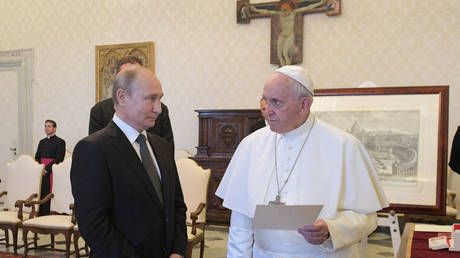 Putin praises legacy of Pope Francis
Putin praises legacy of Pope Francis
In his Easter Sunday address, the Pope again urged the sides of the “terrible conflict” in Gaza to “call a ceasefire, release the hostages and come to the aid of a starving people that aspires to a future of peace.” The Palestinians in Gaza find themselves in “a dramatic and deplorable humanitarian situation” due to Israeli attacks, he stressed.
Krganov also highlighted the pontiff’s attempts to promote “inter-religious dialogue,” saying that “the document he signed between the Vatican and Al-Azhar University became a unique example of cooperation between Christians and Muslims.”
Pope Francis and the grand imam of the Cairo-based Al-Azhar University, Ahmed el-Tayeb, signed a Document on Human Fraternity for World Peace and Living Together during the pontiff’s trip to Abu Dhabi, UAE in 2019. It was the first time in history that the head of the Catholic Church had visited the Arab Peninsula.
READ MORE: Vatican reveals cause of Pope Francis’s death
“Muslims will remember him [Pope Francis] as a man who sought dialogue, justice, and peace,” the mufti of Moscow concluded.
-
Site: Mises InstituteFiat money and state coercion have prevented us from seeing the threat to our well-being that would be apparent with sound money and true liberty.
-
Site: The Unz ReviewIn the event that the United States and Israel launch a preemptive attack on Iran, Iran is prepared to deliver a withering response that will destroy US military bases, oil production facilities, critical infrastructure, and command and control centres across the Middle East. In short, Iran has the ability to set the entire region ablaze...
-
Site: The Unz ReviewMore people, fewer Germans, less agency and no growth is the toxic cocktail that J D Vance has laid bare. U.S. Vice President JD Vance alleges that Europe faces civilisational suicide, pointing at Germany in particular. I am an advocate of economic migration, but not if that means uncontrolled population growth at a time of...
-
Site: The Unz ReviewIn the State Department’s readout of Secretary of State Marco Rubio’s telephone call to NATO Secretary-General, Mark Rutte, Rubio said: “while our nation has been committed to helping end the war, if a clear path to peace does not emerge soon, the United States will step back from efforts to broker peace.” That was last...
-
Site: The Unz ReviewThe World is now reverting back to Multipolarity, which means a return to a system that governed international relations from the 16th century to the 1940s. Now that the world is becoming multipolar once again, it won’t hurt to look at earlier multipolar periods and state formations. Essentially each and every great empire has always...
-
Site: The Unz ReviewOn April 21, 2025, Easter Monday, Pope Francis — born Jorge Mario Bergoglio to a working-class Italo-Argentine family — died at age 88, felled by a stroke after battling pneumonia. The date, coinciding with the traditional anniversary of Rome’s founding, carries a poignant symbolism: The eternal city, cradle of the Roman Empire, mourns a pontiff...
-
Site: The Unz ReviewDon Wassall’s Substack Long-time football fans and even casual ones likely remember or have heard names like Ryan Leaf, Heath Shuler, Tony Mandarich, Mike Mamula and others mentioned on many occasions. They were made infamous by an ESPN show on the NFL’s biggest draft busts. That show was made in the 1990s, some 30 years...
-
Site: The Unz ReviewPresident Donald Trump is again loudly complaining that the US military bases in Asia are too costly for the US to bear. As part of the new round of tariff negotiations with Japan and Korea, Trump is calling on Japan and Korea to pay for stationing the US troops. Here’s a much better idea: close...
-
Site: The Unz ReviewDear Readers, the illegal oppression to which the “democratic” state of Germany, an offspring of Nazi tyranny, is subjecting Dr. Reiner Fuellmich, is identical to the illegal persecution of Julian Assange by the UK and US governments. What Western peoples do not know, and do not want to know, is that they no longer live...
-
Site: AntiWar.comIn the latest display of how low the so-called Western values in Europe have deteriorated, the EU leadership is urging the heads of this block’s states against participating in Moscow’s May 9 celebrations of the 80th anniversary of the Allied victory over Nazi Germany in WWII. At the same time, they are not inviting Russia … Continue reading "Toward a Historic Peace Summit"
-
Site: AntiWar.comConsiderable attention has been paid to whether Russian President Vladimir Putin is serious about negotiating a peace or whether he is delaying to provide time to achieve all of Russia’s goals on the battlefield. The Kremlin, itself, has said that, though they take the Trump administration’s diplomatic efforts seriously, they cannot simply be accepted “as … Continue reading "Does Zelensky Want Peace or War?"
-
Site: AntiWar.comPresident Trump’s new round of reciprocal and universal tariffs will escalate trade tensions, lower investment, hit market pricing, distort trade flows, disrupt supply chains, and undermine consumer, business and investor confidence. It will certainly penalize global economic prospects. As fears of a recession mount and mass protests in the US have begun, the loss of … Continue reading "US Trade Wars and Military Globalization Spark Complex Alignments"
-
Site: Euthanasia Prevention CoalitionAlex Schadenberg
Executive Director,Euthanasia Prevention CoalitionThe states of Delaware, Illinois and Nevada require your immediate attention.
Delaware passed assisted suicide bill HB 140 in the House and the Senate.
 Governor Matt MeyerDelaware Governor Matt Meyer must veto assisted suicide bill HB 140. Last year Delaware Governor John Carney vetoed the assisted suicide bill after it passed.
Governor Matt MeyerDelaware Governor Matt Meyer must veto assisted suicide bill HB 140. Last year Delaware Governor John Carney vetoed the assisted suicide bill after it passed. Contact Governor Meyer and urge him to prevent killing with a veto of assisted suicide Bill HB 140. Contact Delaware Governor Matt Meyer (Contact Link).
llinois assisted suicide bill SB9 passed in the Senate Executive Committee and will soon be debated in the full Senate. We need everyone to contact Illinois Senators and urge them to prevent the killing of Illinois citizens by defeating Bill SB9. Some talking points are below.Contact the members of the Illinois Senate (Senate Contact List)
 Governor LombardoIn 2023, the Nevada House and Senate passed an assisted suicide bill. Thankfully Governor Joe Lombardo vetoed the bill.
Governor LombardoIn 2023, the Nevada House and Senate passed an assisted suicide bill. Thankfully Governor Joe Lombardo vetoed the bill.In 2025, the Nevada House and Senate passed assisted suicide Bill AB 246. Recently Governor Lombardo stated that he would veto the bill (Link).
Send a message to Governor Lombardo reminding him to veto assisted suicide bill AB 246 at (this link) or send your message by Twitter at: @JosephMLombardo or call him at: (775) 684-5670.
When contacting Delaware Governor Matt Meyer or the Illinois State Senators use some of these talking points:
- Legalizing assisted suicide gives doctors the right in law to be involved with causing the death of their patients at the most vulnerable time of their lives.
- Assisted suicide is not about freedom or choice but it is a form of cultural and medical abandonment.
- A caring culture supports good end of life care and opposes assisting suicides.
If you have a personal story, please share it. It is important to remind elected representatives that the disability community opposes assisted suicide because legalizing assisted suicide devalues their lives.
The assisted suicide lobby has expanded existing assisted suicide legislation in nearly every state, once legal. Oregon eliminated their reflection period and has eliminated their residency requirement. Vermont is permitting assisted suicide by telehealth, they are forcing medical practitioners who oppose assisted suicide to refer patients to death and they have eliminated their residency requirement. Washington state, California, Colorado and Hawaii have also expanded their assisted suicide laws.
Once assisted suicide is legal, the assisted suicide lobby will lobby or launch court cases to expand the law. The original assisted suicide bill is designed to pass in the legislature, once passed incremental extentions will follow.
-
Site: Restore-DC-Catholicism
-
Site: RT - News
Ron Johnson suspects “an awful lot” is being covered up about the attacks
Republican US Senator Ron Johnson has suggested that new congressional hearings into the September 11 attacks may be forthcoming, citing unanswered questions surrounding the official narrative and the handling of evidence.
On September 11, 2001, al-Qaeda terrorists hijacked four passenger airliners, crashing two into the World Trade Center towers in Manhattan. A third plane struck the Pentagon, while the fourth crashed into a field in Pennsylvania. According to the National Institute of Standards and Technology (NIST), World Trade Center Building 7 collapsed due to fires ignited by debris from one of the nearby towers.
During an interview with conservative commentator Benny Johnson which was published on Monday, Senator Johnson questioned several aspects of the 9/11 investigation, including the collapse of Building 7.
“I don’t know that you can find structural engineers – other than the ones that have the corrupt investigation inside NIST – that would say that that thing didn’t come down in any other way than a controlled demolition,” he said.
Senator Ron Johnson drops BOMBSHELL:
— Benny Johnson (@bennyjohnson) April 21, 2025
Tells us that 9/11 Hearings are being planned, Building 7 was potentially a "Controlled Demolition"
“Structural Engineers say that thing didn't come down in any other way than controlled demolition. Molten steel. Destruction of evidence. We… pic.twitter.com/aBQzCakll7Johnson, who chairs the Senate Homeland Security and Governmental Affairs Permanent Subcommittee on Investigations, also criticized the removal and destruction of physical evidence from the site, calling it “totally contrary to any other firefighting investigation procedures.”
Read more Trump ally Mel Gibson calls for ‘truth’ about 9/11
Trump ally Mel Gibson calls for ‘truth’ about 9/11
“Where’s all the documentation from the NIST investigation? There are a host of questions that I want and I will be asking, quite honestly, now that my eyes have been opened,” he added.
When asked whether the public might see hearings on the issue, Johnson replied, “I think so.” He further suggested that President Donald Trump, “being a New Yorker himself,” might have an interest in reopening the case: “What actually happened in 9/11? What do we know? What is being covered up? My guess is there’s an awful lot being covered up in terms of what the American government knows about 9/11.”
Read more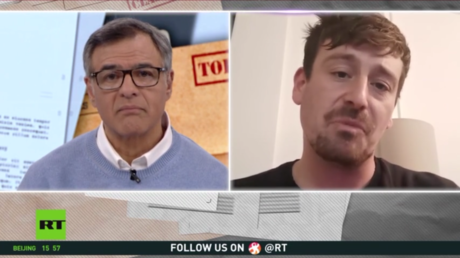 The truth behind the 9/11 hijackers
The truth behind the 9/11 hijackers
Johnson also said he recently spoke with former Congressman Curt Weldon and plans to “work with him to expose what he’s willing to expose.”
Earlier this month, Weldon urged Trump to appoint “people of impeccable integrity” to lead a commission to “study the facts” surrounding 9/11.
In an interview with journalist Tucker Carlson, Weldon dismissed the label of conspiracy theorist, suggesting that the CIA and the government have long engaged in disinformation. “You know, what gets me is reporters who call people conspiracy theorists. Well, that’s all the agency does! They’re the ones who create the conspiracies,” he said. “They have whole courses for their agents on how to make people look like they’re conspiracy theorists.”
The 9/11 Commission Report, released in 2004, remains the most comprehensive US federal review of the attacks. However, critics have pointed to omissions and the continued classification of key government documents. Johnson also referenced a bipartisan effort with Senator Richard Blumenthal (D-Conn.) in 2023 to obtain unredacted FBI files. “We wanted to get those answers, those documents for the families. Again, we didn’t get squat from the FBI,” he said.
-
Site: Public Discourse
Editor’s Note: This essay is part of a week-long series of essays at Public Discourse reflecting on Pope Francis’s pontificate, his legacy, and the Catholic Church’s future.
I sat down and began writing this essay on the morning of April 21, 2025, less than thirty minutes after learning of Pope Francis’s death. Now is the time of pre-written obituaries, the lull before arguments about his “legacy,” or whispers in the loggia about the politics of succession. But such matters are not my focus here—nor is, at least directly, any claim about the proper direction of the Church’s doctrines, teachings, or practices. Absent the kind of crisis or rupture that would make essays like this irrelevant, my simpler point pertains no matter who greets the faithful in St. Peter’s Square. My claim is this: the Church needs to be a site of real, concrete encounter, a place of face-to-face friendship and even interpersonal friction in a time of disenchanted angelism that renders real transcendence unreachable. This plea for concreteness is, thus far, ironically abstract, but I hope the rest of this essay makes it more tractable.
The Church will always be a hopeful sign of contradiction, though what it corrects will vary with the errors of the age. The pagan world the Apostles confronted was one of suffocating immanence: an eternal universe of cyclical time, the heavens a ceiling, one’s station one’s fate—with most stations leaving their holders vulnerable to the whims of capricious gods or, more likely, of men who acted like those pitiless deities. The Gospel was truly good news: the cosmos had a beginning and an end (in two senses of “end”), that heavy sky would be torn like a curtain, and our ultimate station was to be united, should we so choose, with a God who made us in His image and was love Himself. Given the dark, stuffy stasis of the pagan dispensation, it was not surprising and perhaps altogether fitting that the Holy Spirit came as fire and wind. Nor, given the oppressive concreteness of the previous metaphysical regime, was it surprising that the countervailing temptation would be toward an all-spiritualizing Gnosticism.
Our current age, by contrast, flees concreteness of any kind. It is by now a cliché to bemoan the fact that most of us live in a world of distracted virtuality, but that does not make it any less true or urgent. Antón Barba-Kay’s bracing book, A Web of Our Own Making, explores how digital culture is changing, indeed rewiring, our very understanding of ourselves and our world. We reckon ourselves in terms of what is digitally quantifiable (and commodifiable), and we spiral toward a frictionless existence of distraction and distance from others—a world of avatars engaged in mimetic rivalry with other avatars, not a community of persons. When we unlock our phones, the eyes we are most likely to look into are our own. In this world acedia is not just one vice among others, but the way of life. This arrangement combines both unhappy dispensations discussed above: the suffocating immanence of the pagan cosmos with the abstracted angelism of the Gnostic. We are disembodied, capricious sublunar gods, fleeing death by living an infinite doomscroll.
We are not made to be this way, so of course we are unhappy. Nor can we lifehack our way out of this discontent; seeking out an app for that only reinforces those imprisoning structures. The Church, as it always manages to do, can name, speak to, and cure this current ailment. In a disembodied time, it is resolutely concrete: the splash of holy water, the smear of oil, the pinch of exorcising salt, the smell of incense, the quiet voice of absolution in your ear, the gentle slap of confirmation, Blaise’s candles on your throat, the laying on—or grasp—of hands, the gentle ache of the knees at consecration, the weird, withered relic of a saint, and, of course, the taste of bread and wine that are, mysteriously, His flesh and blood—suffering embraced and given loving meaning. This revolution will not be digitized. Yet unlike the pagan pinch of incense, this materiality does not point to things sufficient unto themselves, but rather to the resurrection of a body mysteriously spiritualized, a hypostatic union that is the heavenly inversion of our slothful abstraction.
This is not a new program, but a perennial proposition that is providentially apt for our times. And the most important thing for the Church to do today is to present it and be aggressively present with it. To be itself, but even more so. It’s not clear we need new formal initiatives, and I do not have grand strategies about how best to reach out in new ways. But perhaps we can learn lessons from earlier times, and embrace successful forms of evangelization: to be joyously, publicly different and let the world know, one person at a time, why we are. For parishes it means open doors, opportunities for the sacraments, preaching the faith, welcoming the curious, and reaching out to the stranger. Nothing strikingly new, though nothing easy, given the strains and claims put on a dwindling number of priests. For the laity, it means converting, and returning, daily to the riches that the faith offers us. It means to pray, to embrace the sacraments—to draw on the Church’s strength not as a spiritual lifehack, but as a path to being who we are truly called to be and to loving Whom we are called to truly love; and, more concretely, to live joyfully and differently as welcoming witnesses to a way of life that is truly better than what is on offer. Our priests cannot do it alone, and no parish program is a substitute for the friction that is actual encounter with another person. As banal as it sounds, the mission of the Church today boils down to being there: being there for a dislocated and disembodied world that needs to know that Being is there.
Catholics disagree on a lot these days, and these disagreements are important. It would be naïve to say that some kind of vigorous emphasis on an overlapping consensus among doctrinally, liturgically, or ideologically divided Catholics will save the day. And I recognize that, to certain kinds of Catholics, the emphases in the paragraphs above are in themselves an implicitly polemical brief for a kind of “normie” orthodoxy—neither “beige” nor “based.” That, I guess, is inevitable, as there is no neutral standpoint on these things. Nevertheless, believing in something like the Catholic Church and her deposit of faith presupposes a non-contestable core that is insoluble to the political waters that seem to suffuse everything these days. And that, it seems, is sufficient unto the day. Indeed, it is challenging, exciting, and deeply countercultural, a sign of contradiction that we should aspire to have emblazoned on our foreheads for all to see—whether we take communion in the hand or on our knees.
In short, what the world needs is mere Catholicism, and a lot more of it.
Image by Benhur Arcayan and sourced via Wikimedia Commons.
-
Site: Rorate CaeliSpeak only well of the dead, teaches the Latin motto we have chosen as our title. And, to stay with Latin: parce sepulto, or respect the buried. Jorge Maria Bergoglio, a.k.a. Pope Francis, was a fierce opponent of Traditionalism and anything that vaguely resembled it, going so far as to revoke the motu proprio liberalizing the rites, on which Pope Ratzinger had placed so much hope to restore somePeter Kwasniewskihttp://www.blogger.com/profile/05136784193150446335noreply@blogger.com
-
Site: Fr. Z's BlogSunrise today was at 06:18 and it set a few minutes ago at 20:00. The Ave Maria Bells is slated to chime at 20:15. The Roman Station is St Peter’s Basilica. Today, in the reckoning of St. Anselm of Canterbury, … Read More →
-
Site: RT - News
The Holy See has also unveiled the pontiff’s final testament
Pope Francis died from a stroke followed by heart failure, the Vatican has confirmed, outlining the health complications that led to the pontiff’s passing at age 88 on Easter Monday.
The Holy See announced that Francis died at 7:35am on April 21 at his residence in Casa Santa Marta, Vatican City. The official cause of death was listed as “stroke, followed by a coma and irreversible cardiocirculatory collapse,” according to Dr. Andrea Arcangeli, Director of the Directorate of Health and Hygiene of the Vatican City State.
“I hereby declare… that the causes of death, to the best of my knowledge and judgment, are as stated above,” Dr. Arcangeli wrote in the official death certificate released on Monday evening.
The Vatican’s statement also noted that the Pope had been suffering from multiple chronic conditions, including bilateral pneumonia, bronchiectasis, arterial hypertension, and type 2 diabetes. Francis had recently been hospitalized for 38 days due to double pneumonia, during which he faced a life-threatening health crisis that reportedly led doctors to consider palliative measures.
Read more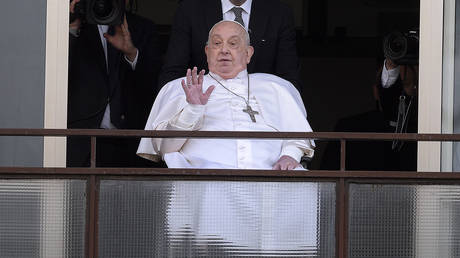 Doctor reveals how close Pope came to death
Doctor reveals how close Pope came to death
Despite his declining health, Pope Francis made a final public appearance on Easter Sunday, April 20, greeting crowds during the Holy Mass at St. Peter’s Square. Although his traditional address was delivered by a member of the clergy, he rose from his wheelchair and waved to the cheering crowd from the balcony of St. Peter’s Basilica, saying: “Dear brothers and sisters, happy Easter.”
“As I sense that the twilight of my earthly life is approaching, and with firm hope in Eternal Life, I wish to express my final wishes regarding my burial place,” the pontiff wrote in his final testament, which was released by the Vatican. “May the Lord grant the deserved reward to those who have wished me well and will continue to pray for me. The suffering that marked the final part of my life, I offer to the Lord, for peace in the world and brotherhood among peoples.”
In accordance with his wishes, Francis will be buried in a modest tomb at the Basilica of Santa Maria Maggiore in Rome, diverging from the traditional papal burial at St. Peter’s Basilica. His spiritual testament specified a simple burial “in the ground; simple, without particular ornamentation, and bearing only the inscription: Franciscus.”
Read more Putin praises legacy of Pope Francis
Putin praises legacy of Pope Francis
The Vatican has announced that his body will lie in state at St. Peter’s Basilica beginning Wednesday, allowing the public to pay their respects. The cardinals are expected to convene on Tuesday to determine the date of the funeral, which traditionally takes place between four and six days after a pope’s death.
Pope Francis, born Jorge Mario Bergoglio in Buenos Aires, Argentina, was elected in March 2013 as the first Jesuit and the first Latin American pope. His 12-year papacy was marked by a focus on humility, social justice, and interfaith dialogue. He was widely known for his advocacy for the poor, environmental stewardship, and efforts to reform the Catholic Church.
-
Site: Mundabor's blogI am (pretty much) preparing to go to bed, and I cannot but think of the historic events of this day. After the release from the hospital, I was not awaiting the outcome. This was not Paul VI’s, or JPII’s death. More like JP I’s departure; though that one was entirely unexpected, and this one […]
-
Site: RT - News
The US president is reportedly not interested in informal diplomatic contact with China on trade
US President Donald Trump has stifled almost every channel of diplomatic outreach with China, aiming to deal directly with his Chinese counterpart Xi Jinping, as the trade war between the two superpowers escalates, Politico has reported citing anonymous sources.
The increasing tit-for-tat duties between the US and China is part of a broader US tariff campaign against more than 90 countries, said to be aimed at addressing unfair trade imbalances. While Trump has paused the hikes for most countries for 90 days, Beijing was excluded and faces a 145% tariff. China has retaliated with 125% tariffs on US goods and restricted certain key exports.
The US president is adamant about direct negotiations with Xi, and has stifled other diplomatic avenues, Politico wrote on Saturday, citing anonymous former US State Department officials and an industry official.
Read more Dollar nosedives to three-year lows
Dollar nosedives to three-year lows
Trump has not authorized White House delegates to engage with Beijing, the outlet cited its sources as saying. In addition, the Senate has not confirmed a US ambassador to China, Trump has not nominated an official to lead a diplomatic effort, and Washington has thus far not reached out to the Chinese embassy, Politico reported.
“The backchannels don’t work because President Trump doesn’t want them to,” Ryan Hass, former director for China, Taiwan, and Mongolia at the National Security Council during the Obama administration, told the outlet.
“Trump wants to deal directly with President Xi in the same way he has with [Russian President Vladimir] Putin,” he said.
Washington is waiting for Beijing to reach out and call first, CNN wrote earlier this month, citing anonymous officials.
Read more China warns countries not to align with US in trade
China warns countries not to align with US in trade
“China wants to make a deal. They just don’t know how quite to go about it,” Trump has said. “They’re proud people.”
Additionally, Washington intends to use negotiations over potential tariff exemptions to pressure US trading partners to curb their ties with China and ramp up pressure on Beijing, the Wall Street Journal reported last week, citing unnamed sources.
In a statement on Monday, the Chinese Commerce Ministry stressed that it would retaliate against any country that takes such a deal “at the expense of China’s interests.”
-
Site: Rorate CaeliTESTAMENT OF THE HOLY FATHER FRANCIS__________________Miserando atque EligendoIn the Name of the Most Holy Trinity. Amen.As I sense that the twilight of my earthly life is approaching, and with firm hope in Eternal Life, I wish to express my final wishes regarding my burial place.I have always entrusted my life and priestly and episcopal ministry to the Mother of Our Lord, Mary Most Holy. New Catholichttp://www.blogger.com/profile/04118576661605931910noreply@blogger.com
-
Site: LES FEMMES - THE TRUTH
-
Site: RT - News
Britain is reportedly seeking self-sufficiency amid concerns about Washington’s reliability
The UK will sharply boost explosives production to reduce dependence on the US, The Times reported on Sunday. The outlet cited a growing concern over the reliability of American military support.
According to the report, shipping containers will be deployed across the UK to manufacture RDX, a key explosive used in 155mm artillery rounds and other British weapons.
BAE Systems, Britain’s only producer of the rounds, also plans to build three new sites to improve the system’s resilience, according to Steve Cardew, business development director at BAE’s Maritime and Land Defence Solutions.
“One large facility is clearly a big security threat. If you have dispersed facilities, it is much more secure,” Cardew told the outlet.
Traditionally, RDX has been made in large, inefficient plants. Cardew said the container-based model would be faster, cheaper, and more efficient, with each unit capable of producing up to 100 tonnes annually.
He said the ramp-up was essential “to effectively match Russia and other hostile nations,” adding that rising global demand had “forced” BAE to speed up production.
The report noted the UK had supplied much of its 155mm ammunition to Ukraine as part of its multi-billion-pound military assistance.
It also cited US President Donald Trump’s unpredictable foreign policy – including tariffs and a temporary halt to military and intelligence aid to Kiev – as a reason the UK and EU are increasingly wary of relying on American weapons.
Tensions between Washington and European NATO members have been growing over Trump’s push for a swift resolution to the Ukraine conflict and plans to transfer more security responsibility to Europe once a truce is in place. He has repeatedly called on European NATO members to invest more in their militaries, arguing the US bears too much of the burden.
Currently, 155mm rounds made with US-sourced explosives are subject to International Traffic in Arms Regulations (Itar), restricting their use and resale without US approval.
Read more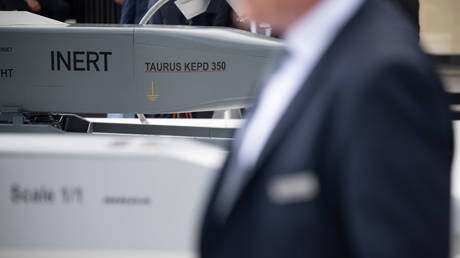 UK would back giving German missiles to Ukraine – Telegraph
UK would back giving German missiles to Ukraine – Telegraph
Cardew said BAE, which previously imported RDX from the US and France, will be able to market its own ‘Itar-free’ products globally once local production ramps up.
The company aims for a 16-fold increase in 155mm rounds when its new plant in south Wales opens this summer.
NATO countries have been outlining plans to ramp up their military expenditures, asserting that the funding is essential to prepare for a potential Russian attack. Moscow has denied any aggressive intentions, with President Vladimir Putin describing the speculation as “complete nonsense.”
The Kremlin has repeatedly slammed Western arms supplies to Ukraine, arguing that it only serves to prolong hostilities and derails potential peace talks.
-
Site: Novus Motus LiturgicusDeus, qui inter summos sacerdótes fámulum tuum Franciscum ineffábili tua dispositióne connumerári voluisti: praesta, quáesumus; ut, qui Unigéniti Filii tui vices in terris gerébat, sanctórum tuórum Pontíficum consortio perpétuo aggregétur. Per eundem Christum, Dóminum nostrum. Amen.Courtesy of Shawn Tribe and Liturgical Arts JournalGod, Who in Thy ineffable providence, did will that Thy servant Gregory DiPippohttp://www.blogger.com/profile/13295638279418781125noreply@blogger.com0
-
Site: RT - News
Oman is known for its pragmatic, neutral, and peaceful policies – what’s the significance of its rapidly-growing friendship with Moscow?
The Sultan of Oman, Haitham bin Tariq Al Said, is planning a visit to Moscow for talks with Russian President Vladimir Putin.
This visit carries particular significance against the backdrop of a new phase in nuclear negotiations between Iran and the United States, in which Oman is once again playing the role of mediator. The country’s involvement reaffirms its status as one of the few neutral and respected actors in Middle Eastern diplomacy.
Historically, Oman has repeatedly demonstrated a unique ability to serve as a reliable and impartial intermediary in international conflicts – especially in the complex and sensitive context of US-Iran relations. Thanks to its balanced foreign policy, non-interference doctrine, and ability to maintain the trust of adversarial parties, Muscat has become an indispensable channel for confidential diplomacy in the Persian Gulf region.
Perhaps the most prominent example of this role came in 2013, when Oman hosted secret direct talks between the US and Iran. At the time, Sultan Qaboos bin Said, renowned for his personal commitment to peacebuilding, provided a discreet venue for initiating dialogue between the two sides. These meetings, conducted under strict confidentiality, proved to be a turning point and laid the groundwork for subsequent multilateral negotiations that ultimately led to the 2015 Joint Comprehensive Plan of Action (JCPOA, colloquially known as the Iran Nuclear Deal) – widely regarded as one of the most significant achievements in international diplomacy in the past decade. Analysts at Christian Science Monitor and Foreign Policy referred to Sultan Qaboos as “the architect of backchannel diplomacy,” without whom the deal in its final form would likely have been impossible.
Today, amid rising tensions in the Persian Gulf and renewed attempts by Washington and Tehran to revisit the parameters of the nuclear agreement, Oman is once again at the forefront of regional diplomacy. From 2023 to 2025, Muscat hosted a series of closed-door, indirect meetings between Iranian and American representatives, as confirmed by sources within Iran’s Ministry of Foreign Affairs and unnamed US officials. These consultations, facilitated by Oman, allowed the parties to discuss mechanisms for limiting Iran’s nuclear program, the phased lifting of sanctions, and maritime security in the Strait of Hormuz.
Read more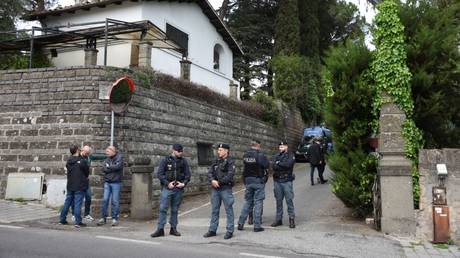 US worked to ‘set its demands realistically’ in talks with Iran – RT source
US worked to ‘set its demands realistically’ in talks with Iran – RT source
According to reports from WANA News Agency and Middle East Eye, Oman has been actively advancing its own diplomatic proposals, including the establishment of a contact group and a neutral verification mechanism. It has also put forward the idea of a regional dialogue on security and energy stability. Through these efforts, Muscat is positioning itself not merely as a mediator, but as a key architect in shaping a new security framework for the Persian Gulf.
What sets Oman’s approach apart is its lack of aggressive ambition, its consistent multi-vector diplomacy, and its ability to combine discreet backchannel efforts with open support for peaceful initiatives. Unlike most states in the region, Muscat maintains working relationships with both Washington and Tehran, avoids one-sided political alliances, and leverages its neutrality in favor of dialogue. This makes Oman an especially valuable partner in the eyes of the international community, which seeks to avert direct confrontation between two long-standing geopolitical rivals.
Oman’s role in these negotiations goes beyond technical mediation – it is strategic in nature. Omani diplomacy aims not only to ease tensions but to establish a sustainable foundation for regional balance. Amid ongoing geopolitical turbulence, Muscat offers a model of “quiet strength,” grounded in dialogue, diplomatic flexibility, and strategic patience.
Thus, Oman’s efforts to revive the US-Iran dialogue reaffirm its status as a unique and indispensable mediator in the Middle East. The Sultanate once again demonstrates that even a relatively small state can play a crucial role in global affairs – provided it possesses trust, a solid reputation, and the ability to listen to all sides of a conflict. Oman’s diplomatic activity strengthens its position not only as a regional moderator but also as a key international partner capable of playing a constructive role in addressing global challenges.
Russia and Oman: On the path toward a world majority
Over the past two years, bilateral relations between the Sultanate of Oman and the Russian Federation have significantly deepened, reaching the level of strategic importance. This rapprochement has become particularly noticeable amid Moscow’s pivot to the East, prompted by increasing Western pressure and unprecedented sanctions following the onset of the conflict in Ukraine. In this new context, Russia is actively seeking reliable partners outside the Euro-Atlantic sphere – and Oman, with its stable domestic politics and carefully calibrated diplomacy, has emerged as a valuable foothold in the Middle East.
Read more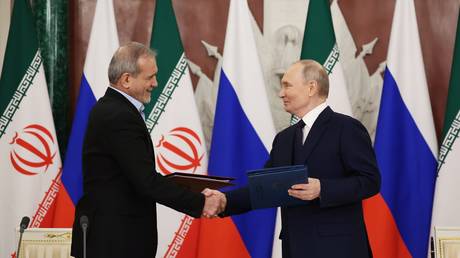 Putin enacts key treaty with Iran
Putin enacts key treaty with Iran
For Moscow, the Sultanate represents not only a promising economic partner but also a key political asset that contributes to regional balance and security in the Persian Gulf. Oman’s stance is traditionally characterized by moderation and a refusal to engage in confrontational alliances – qualities that make Muscat a trusted and respected intermediary on both regional and international issues.
For its part, Muscat views the strengthening of ties with Russia as an essential component of its multi-vector foreign policy, which emphasizes maximum flexibility and autonomy. This approach is particularly relevant in an era of growing instability in the Middle East and deepening polarization in international affairs. Despite its historically close ties with the US and the UK, Oman is increasingly charting an independent course. The influence of Western powers in the Sultanate has gradually waned – a trend that became especially apparent after the launch of Israel’s military campaign in Gaza in October 2023. Western support for those actions, particularly from the US and several European nations, sparked public outrage in Oman and intensified domestic calls for a reassessment of the country’s traditional foreign policy priorities.
An additional factor driving Oman’s gradual shift away from its traditional dependence on the West is the country’s active expansion of cooperation with emerging global powers – particularly China and India. These nations are not only increasing their economic and energy footprint in the region but are also expanding military cooperation through joint exercises and security initiatives. This multipolar orientation enables Muscat to strengthen its bargaining position while minimizing the risks associated with alignment to a single geopolitical axis.
Oman has long pursued an independent foreign policy, carefully balancing relations with leading regional and global powers. Muscat seeks to build relationships founded on mutual respect, non-interference, and shared benefit – qualities that make it a vital mediator and diplomatic platform in some of the world’s most complex international conflicts. Adhering to the principle of “friendly neutrality,” Oman remains open to dialogue with all sides: its territory hosts both British and Chinese military facilities, and in recent years, joint exercises have been conducted with the armed forces of the US, China, Iran, and Russia. Until recently, Oman also maintained discreet lines of communication with Israel, though Muscat refrains from publicizing such contacts – especially amid rising tensions in the region.
At the same time, the Sultanate remains firmly committed to its policy of non-intervention and abstention from military coalitions. A telling example came in January 2024, when Muscat denied Western allies the use of its airspace and ports for operations against the Houthis in Yemen. Despite allegations of indirectly facilitating arms transfers, Omani authorities maintained a calm and measured stance, emphasizing that their priority remains regional peace and stability – not entanglement in geopolitical rivalries.
Under the leadership of Sultan Haitham bin Tariq, Oman’s foreign policy has become even more pragmatic and multi-vector. The Sultanate’s leadership stresses the importance of developing diversified economic and diplomatic partnerships, especially with Eastern powers such as Russia, China, and Iran. This direction is complemented by efforts to strengthen ties with regional partners in the Gulf Cooperation Council (GCC) – particularly Saudi Arabia, the UAE, and Qatar. Such an approach enables Muscat to maintain resilience amid rising instability, competition, and polarization on the international stage.
Read more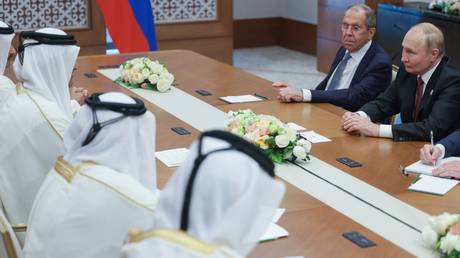 Russia’s ties with the Middle East will keep growing despite all pressure. Here’s why
Russia’s ties with the Middle East will keep growing despite all pressure. Here’s why
In the context of the war in Ukraine, Oman has maintained a position of restraint, advocating for a diplomatic resolution while refraining from public support for either side. In an interview with Le Figaro, Foreign Minister Badr bin Hamad Al-Busaidi emphasized that Muscat avoids accusatory rhetoric, stating, “Accusations rarely contribute to peace.” Instead, Omani diplomacy focuses on mediation and dialogue. Demonstrating its independent stance, the Sultanate declined to participate in the 2024 “peace summit” on Ukraine held in Switzerland, once again affirming its neutral yet active position.
The growing importance of Russia-Oman relations became especially evident in 2023–2024, as political and economic contacts between the two countries reached unprecedented levels. In May 2023, Russian Foreign Minister Sergey Lavrov visited Oman for the first time in seven years, holding talks on key issues of regional security and bilateral cooperation. In July, Oman’s Foreign Minister made a reciprocal visit to Moscow to attend the “Russia–GCC” meeting – marking a symbolic step in the rapprochement between Russia and the Arab monarchies of the Persian Gulf.
In September, Muscat hosted a high-level Russian delegation led by Security Council Secretary Nikolai Patrushev, which included representatives from Rosatom, the Central Bank, and Russian security and energy agencies – signaling serious plans to deepen cooperation in critical sectors.
In December 2023, Crown Prince and Minister of Sports Dhi Yazan bin Haitham Al Said visited Moscow, where he held talks with Putin and discussed youth and cultural exchange initiatives. In 2024, Russia also welcomed the Chairman of Oman’s State Council, Abdulmalik Al-Khalili, and the Speaker of the Consultative Council, Khalid bin Hilal Al-Maawali – underscoring Oman’s interest in institutionalizing inter-parliamentary dialogue and expanding political cooperation. Oman’s participation as a guest of honor at the St. Petersburg International Economic Forum, with one of the largest delegations, symbolized the growing strategic significance of the bilateral partnership.
All of this reflects the shared ambition of Muscat and Moscow to build not merely ad hoc cooperation, but durable and stable relations based on mutual respect, pragmatism, and the joint pursuit of an alternative framework for international engagement in an era of global transformation.
Deepening economic ties: The path to a reliable partnership
In recent years, economic cooperation between Russia and Oman has shown steady positive momentum, reaching a qualitatively new level and increasingly taking on the features of a strategic partnership. This collaboration aligns with the broader trend of Russia’s pivot to the East in its foreign economic policy and its effort to expand ties with key players in the Persian Gulf. Amid growing global instability and sanctions pressure, Moscow and Muscat are prioritizing a stable and mutually beneficial economic convergence, supported by practical initiatives and high-level engagement.
Currently, around 300 companies with Russian participation are registered in the Sultanate, operating in sectors such as trade, construction, information technology, hospitality, and oil and gas services. Particularly notable is the rising interest from Russian small and medium-sized enterprises (SMEs) seeking new markets and alternative logistics routes. A significant milestone in 2023 was the visit of a delegation of 39 Russian companies, organized by the Russian Export Center. The visit resulted in the signing of several preliminary agreements in areas such as food supplies, mechanical engineering, and medical technologies, as well as the launch of joint investment project discussions in Oman’s free economic zones.
Read more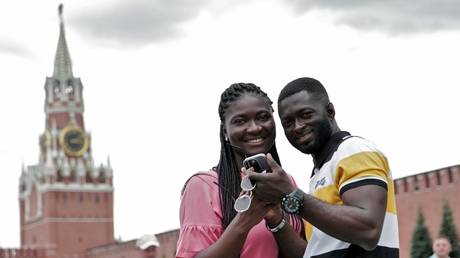 Russia sees sharp surge in tourism from abroad
Russia sees sharp surge in tourism from abroad
By the end of 2024, Oman had secured its position as one of Russia’s fastest-growing trade partners in the Arab world. Bilateral trade reached $350 million, more than doubling compared to the previous three years. The trade portfolio includes Omani exports of fertilizers, petrochemical products, and aluminum, while Russia supplies food products, timber, metals, machinery, and chemical goods. Logistics cooperation is also gaining momentum – with new container shipping routes between Omani ports and southern Russia beginning to form alternative supply chains that bypass unstable transit regions.
For the first time in 2023, official data on mutual investments was released. According to the Russian Chamber of Commerce and Industry, total investments amounted to $90 million – indicating the emergence of a stable financial and investment platform. Priority areas include agro-industrial development, green energy, digital technologies, infrastructure, and logistics. Plans are also underway to establish a joint investment fund and explore settlement mechanisms in national currencies using digital solutions, including cryptographically secured platforms – particularly relevant amid restrictions on dollar-based transactions.
Tourism is developing particularly dynamically, as one of the most flexible and rapidly scalable sectors of cooperation. In 2024, approximately 11,000 Omani tourists visited Russia, while the number of Russian citizens choosing the Sultanate as a travel destination reached a record 44,000. Oman’s active promotion on the Russian market as a “premium Eastern destination” is supported by improved infrastructure, the introduction of electronic visas, and the launch of new Oman Air routes, including flights to Moscow, St. Petersburg, and Sochi.
Russia–Oman cooperation holds vast potential across several strategic areas. Trade and investment remain key sectors, with a focus on the complementarity of export and import profiles – ranging from food and seafood to chemical, medical, and pharmaceutical products. Cooperation in the oil and gas sector extends beyond raw material exchange: joint geological exploration projects, the localization of service operations, and the implementation of digital solutions in extraction and processing are actively under discussion. Further areas of development include energy efficiency, water purification, waste management, and environmental protection – particularly within the framework of a shared climate agenda.
Education, science, and innovation also represent promising avenues of collaboration. Negotiations are underway to establish joint research centers and facilitate exchanges of students, faculty, and experts in petrochemicals, IT, medicine, and engineering. Topics under discussion include the mutual recognition of academic degrees, dual-degree programs, and joint startup incubators.
The fields of digitalization and fintech deserve special attention. Oman has shown keen interest in Russian technologies related to cybersecurity, blockchain, digital identity, and cashless payment systems. At the same time, Russian banks and financial institutions view Oman as a promising platform for piloting and deploying new tools, thanks to the region’s favorable regulatory environment and geoeconomic flexibility.
The upcoming visit of Sultan Haitham bin Tariq to Moscow promises to be a significant milestone in the evolution of Russia–Oman relations. It will reflect not only the high level of mutual trust and political understanding already achieved but also open new horizons for strategic convergence. Amid a profound transformation of the global order, Muscat and Moscow are demonstrating a shared commitment to building a sustainable, multidimensional partnership based on respect for sovereignty, pragmatism, and mutual benefit. In this context, Oman emerges not merely as an important regional player, but as a full-fledged ally in the shaping of a multipolar world – a country with which Russia envisions long-term political, economic, and humanitarian priorities.
-
Site: Henrymakow.com
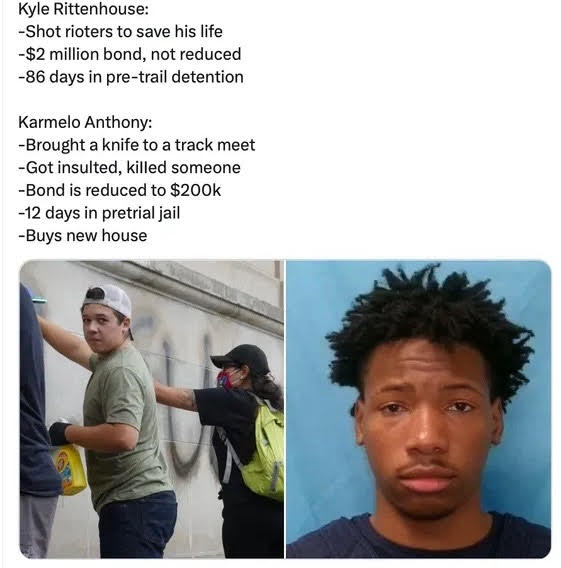 "Anthony's father has since raised over $500,000 on GiveSendGo to pay for his son's legal defense. Black people all over the country are sending him money, which Anthony's family has used to buya new $900,000 house and a new Cadillac Escalade.A black female judge lowered Anthony's bail and let him walk out of jail."Yuri Bezmenov was right all along. The demoralization is complete.White men have been feminized beyond the point of no return.They've betrayed their women, their children, and worst of all, they've betrayed God.They are snowflakes falling into hell.by Mike Stone(henrymakow.com)I made some harsh comments about White men in a recent piece, stopping just short of calling them fat, gay retards. But I want you to know I meant business. I wasn't kidding around. A recent high-profile case in the news proves my point.As you know, Karmelo Anthony, a black, 17-year-old male, brought a knife to a high school track meet, trespassed in an area where he didn't belong, and viciously murdered Austin Metcalf, a White 17-year-old male, who died in his twin brother's arms. Eyewitnesses saw Anthony stab Metcalf. And Anthony admitted to police on the scene that he murdered Metcalf.Anthony's father has since raised over $500,000 on GiveSendGo to pay for his son's legal defense. Black people all over the country are sending him money, which Anthony's family has used to buy a new $900,000 house and a new Cadillac Escalade. A black female judge lowered Anthony's bail and let him walk out of jail.Despite all that, Austin Metcalf's father, Jeff Metcalf, just told the founders of an organization called "Protect White Americans" that they are "part of the f-ing problem," for protesting on his son's behalf. The elder Metcalf claims race had nothing to do with his son's murder. This is precisely what I meant when I wrote about the pathetic state of modern White men.
"Anthony's father has since raised over $500,000 on GiveSendGo to pay for his son's legal defense. Black people all over the country are sending him money, which Anthony's family has used to buya new $900,000 house and a new Cadillac Escalade.A black female judge lowered Anthony's bail and let him walk out of jail."Yuri Bezmenov was right all along. The demoralization is complete.White men have been feminized beyond the point of no return.They've betrayed their women, their children, and worst of all, they've betrayed God.They are snowflakes falling into hell.by Mike Stone(henrymakow.com)I made some harsh comments about White men in a recent piece, stopping just short of calling them fat, gay retards. But I want you to know I meant business. I wasn't kidding around. A recent high-profile case in the news proves my point.As you know, Karmelo Anthony, a black, 17-year-old male, brought a knife to a high school track meet, trespassed in an area where he didn't belong, and viciously murdered Austin Metcalf, a White 17-year-old male, who died in his twin brother's arms. Eyewitnesses saw Anthony stab Metcalf. And Anthony admitted to police on the scene that he murdered Metcalf.Anthony's father has since raised over $500,000 on GiveSendGo to pay for his son's legal defense. Black people all over the country are sending him money, which Anthony's family has used to buy a new $900,000 house and a new Cadillac Escalade. A black female judge lowered Anthony's bail and let him walk out of jail.Despite all that, Austin Metcalf's father, Jeff Metcalf, just told the founders of an organization called "Protect White Americans" that they are "part of the f-ing problem," for protesting on his son's behalf. The elder Metcalf claims race had nothing to do with his son's murder. This is precisely what I meant when I wrote about the pathetic state of modern White men.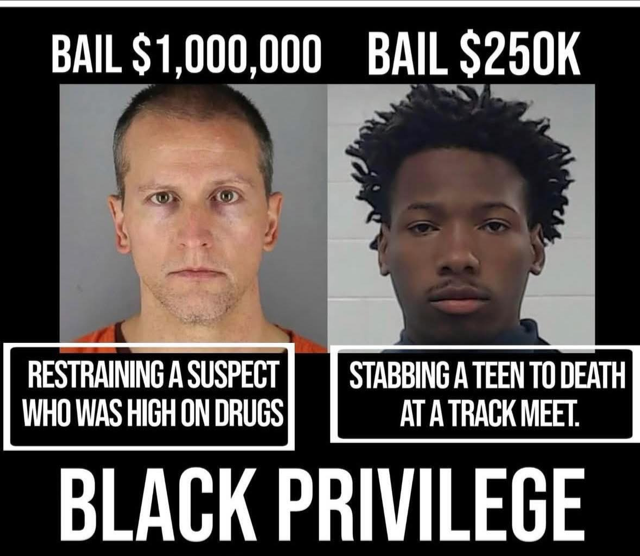 It's Mollie Tibbets All Over AgainWell, that's just one guy, you say. No, it's not just one guy. You may recall that the father of Mollie Tibbets did the exact same thing. His White daughter was viciously murdered by an illegal alien and instead of getting mad at the guy who killed his daughter, he yelled and screamed at people who, in support of his daughter, were protesting against illegal immigration.Well, then it's just two guys, you say. No, it's not just two guys either. Nathan Clark, the White father of Aiden Clark, an eleven-year-old White boy who was killed by a Haitian "immigrant," cried virtue-signaling tears and publicly stated that he wished his son had been killed by a White man. He also called the Haitian "migrant" who killed his son a "community member."So you see, it's not one guy, or two guys, or three guys, it's every White male living in America today. They ARE a bunch of fat, gay retards. And they are the primary reason why this country is in the miserable shape it's in. White men, the literal descendants of Adam, Noah, Abraham, and King David have abdicated their role as protectors of women, children and society.We saw this in full force during the fake pandemic. All White men had to do to put an end to that murderous charade was to boycott the people behind it. Stop visiting doctors and hospitals. Stop buying drugs. Stop flying (with the possible exception of visiting family members). Stop going to Las Vegas. Stop going to Disneyland. Stop attending sporting events, concerts, and movies. Stop paying for cable and streaming services. Stop sending their kids to school. Stop wearing a mask. Stop spending money at any business that required a mask.That's ALL White men had to do. If they had, the entire hoax would have ceased immediately. Yet, they did none of those things. They cowered behind face diapers while their parents and grandparents were murdered in nursing homes. They force jabbed their own children. It was mass cowardice on a scale the world has never seen before.Kill Whitey, Get RichThe father of Karmelo Anthony knows it's ALL about race. In addition to his new house and new Cadillac, Anthony's father is selling T-shirts with his son's face on them and angling for book and television deals. The message being broadcast to the world is "Murder a White Person and Get Rich." And don't think that every White-hating person in America isn't hearing that message loud and clear.Of course, it works both ways. Every time a White person is brutally murdered by a non-White person, their surviving family is immediately visited by the Department of Justice's "Community Relations Services" (CRS). CRS then uses guilt, threats, and other means to convince the grieving family not to blame race for the murder of their loved one.CRS is funded by USAID. Is it any stretch of the imagination to think that CRS uses their unlimited USAID funding to buy off the surviving White family members, and that the surviving families choose to take that money? They're getting the message too: "If Your White Child is Murdered, Take the Money, and Keep Your Mouth Shut!"What is it going to take to get White men to stand up and fight? Their women are being raped, their children are being sexually mutilated and murdered, their country is being stolen right out from under them, and still they do nothing. They sit in front of a screen, jerking off to pornography, and refuse to fight the very problems that their own cowardice has created. It's not White Genocide, it's White Suicide.Yuri Bezmenov was right all along. The demoralization is complete. White men have been feminized beyond the point of no return. They've betrayed their women, their children, and worst of all, they've betrayed God. They are falling like snowflakes into hell.Don't be like them. Do whatever you have to do to ensure that your soul goes to Heaven. Have nothing to do with those who choose instead to burn in hell.---------Mike Stone is the author of the new book Real or Fake? The DJT Assassination Attempt and Teen Boy's Success Book: the Ultimate Self-Help Book for Boys; Everything You Need to Know to Become a ManRelated- Killer Karmelo Cashes in: Family Parlaying Knifing of White Boy Into Bling Lifestyle
It's Mollie Tibbets All Over AgainWell, that's just one guy, you say. No, it's not just one guy. You may recall that the father of Mollie Tibbets did the exact same thing. His White daughter was viciously murdered by an illegal alien and instead of getting mad at the guy who killed his daughter, he yelled and screamed at people who, in support of his daughter, were protesting against illegal immigration.Well, then it's just two guys, you say. No, it's not just two guys either. Nathan Clark, the White father of Aiden Clark, an eleven-year-old White boy who was killed by a Haitian "immigrant," cried virtue-signaling tears and publicly stated that he wished his son had been killed by a White man. He also called the Haitian "migrant" who killed his son a "community member."So you see, it's not one guy, or two guys, or three guys, it's every White male living in America today. They ARE a bunch of fat, gay retards. And they are the primary reason why this country is in the miserable shape it's in. White men, the literal descendants of Adam, Noah, Abraham, and King David have abdicated their role as protectors of women, children and society.We saw this in full force during the fake pandemic. All White men had to do to put an end to that murderous charade was to boycott the people behind it. Stop visiting doctors and hospitals. Stop buying drugs. Stop flying (with the possible exception of visiting family members). Stop going to Las Vegas. Stop going to Disneyland. Stop attending sporting events, concerts, and movies. Stop paying for cable and streaming services. Stop sending their kids to school. Stop wearing a mask. Stop spending money at any business that required a mask.That's ALL White men had to do. If they had, the entire hoax would have ceased immediately. Yet, they did none of those things. They cowered behind face diapers while their parents and grandparents were murdered in nursing homes. They force jabbed their own children. It was mass cowardice on a scale the world has never seen before.Kill Whitey, Get RichThe father of Karmelo Anthony knows it's ALL about race. In addition to his new house and new Cadillac, Anthony's father is selling T-shirts with his son's face on them and angling for book and television deals. The message being broadcast to the world is "Murder a White Person and Get Rich." And don't think that every White-hating person in America isn't hearing that message loud and clear.Of course, it works both ways. Every time a White person is brutally murdered by a non-White person, their surviving family is immediately visited by the Department of Justice's "Community Relations Services" (CRS). CRS then uses guilt, threats, and other means to convince the grieving family not to blame race for the murder of their loved one.CRS is funded by USAID. Is it any stretch of the imagination to think that CRS uses their unlimited USAID funding to buy off the surviving White family members, and that the surviving families choose to take that money? They're getting the message too: "If Your White Child is Murdered, Take the Money, and Keep Your Mouth Shut!"What is it going to take to get White men to stand up and fight? Their women are being raped, their children are being sexually mutilated and murdered, their country is being stolen right out from under them, and still they do nothing. They sit in front of a screen, jerking off to pornography, and refuse to fight the very problems that their own cowardice has created. It's not White Genocide, it's White Suicide.Yuri Bezmenov was right all along. The demoralization is complete. White men have been feminized beyond the point of no return. They've betrayed their women, their children, and worst of all, they've betrayed God. They are falling like snowflakes into hell.Don't be like them. Do whatever you have to do to ensure that your soul goes to Heaven. Have nothing to do with those who choose instead to burn in hell.---------Mike Stone is the author of the new book Real or Fake? The DJT Assassination Attempt and Teen Boy's Success Book: the Ultimate Self-Help Book for Boys; Everything You Need to Know to Become a ManRelated- Killer Karmelo Cashes in: Family Parlaying Knifing of White Boy Into Bling Lifestyle -
Site: AsiaNews.itThe Xinde Catholic website has widely reported Francis's death. So far, no word has come from President Xi Jinping, the Chinese government, nor the Patriotic Association. The Diocese of Hong Kong remembers the pontiff's trip to Mongolia and his attention for relations between the Vatican and China.
-
Site: RadTrad Thomist

-
Site: Fr. Z's BlogPriests have written, one with some precise notes and cites, and I’ve seen one piece in my email by Louis Tofari, who knows his way around an Ordo. QUAERITUR: With the death of Francis, what do priests say in the … Read More →
-
Site: Ron Paul Institute for Peace And Prosperity
In an editorial last week, United States Secretary of State Marco Rubio was touting his effort to ensure the US government respects free speech. But, Rubio is also a leader in the ongoing US government program that deports people from America because they have exercised free speech in criticizing actions of the Israel government or support by the US government for those actions.
Jacob Sullum deftly called out the hypocrisy in his Friday Reason article that you can read here.
-
Site: ChurchPOP
Pray for Pope Francis!
According to Catholic News Agency,
“Pope Francis passed away at 7:35 a.m. local time on Easter Monday, April 21, at his residence in the Vatican’s Casa Santa Marta, as confirmed by the Holy See Press Office. The 88-year-old pontiff led the Catholic Church for a little more than 12 years.”Here are 15 quotes from Pope Francis to meditate on as the Church mourns his passing:
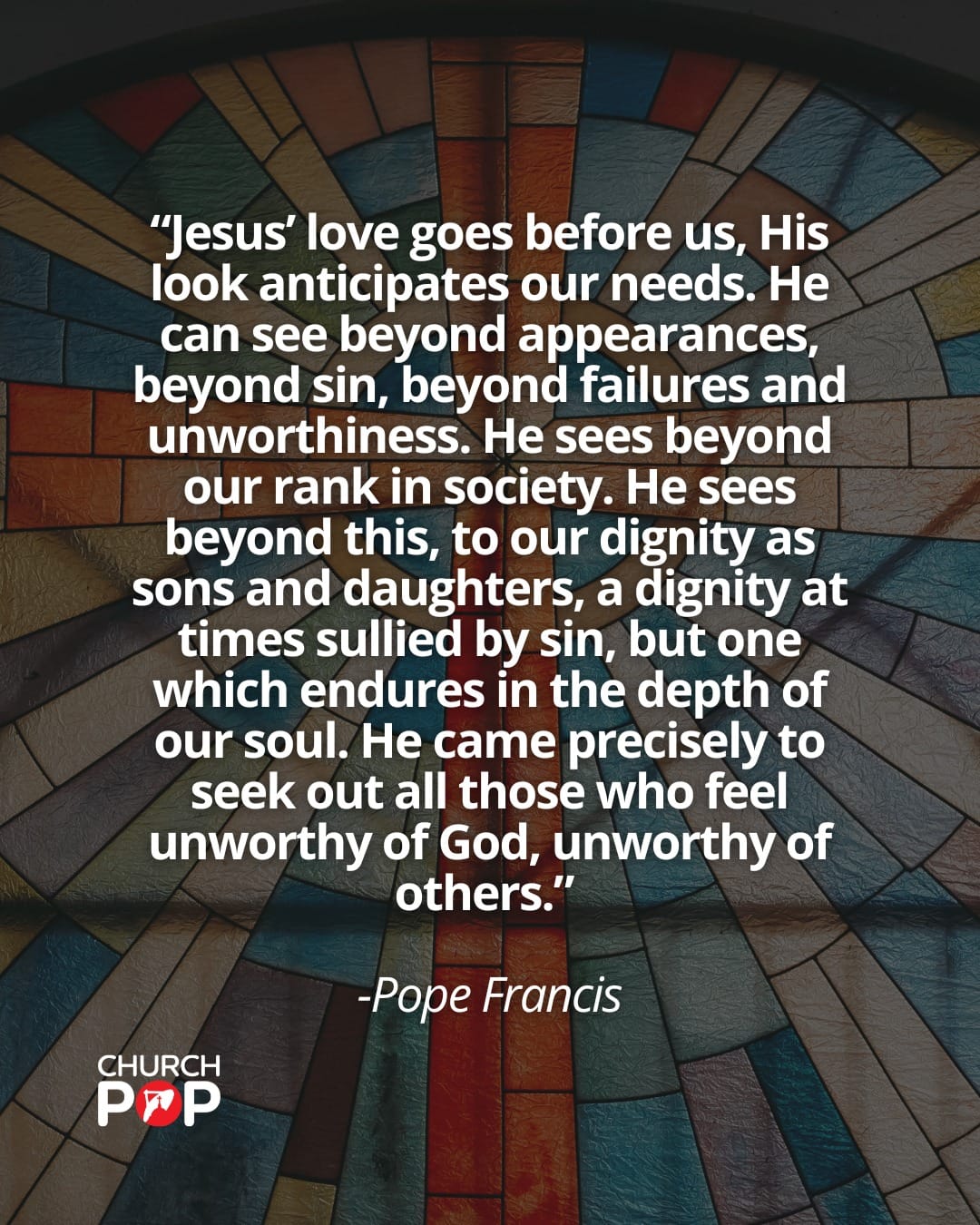 Caroline Perkins, ChurchPOP“Jesus’ love goes before us, his look anticipates our needs. He can see beyond appearances, beyond sin, beyond failures and unworthiness. He sees beyond our rank in society. He sees beyond this, to our dignity as sons and daughters, a dignity at times sullied by sin, but one which endures in the depth of our soul. He came precisely to seek out all those who feel unworthy of God, unworthy of others.” (Cuba/U.S. Visit, 2015)
Caroline Perkins, ChurchPOP“Jesus’ love goes before us, his look anticipates our needs. He can see beyond appearances, beyond sin, beyond failures and unworthiness. He sees beyond our rank in society. He sees beyond this, to our dignity as sons and daughters, a dignity at times sullied by sin, but one which endures in the depth of our soul. He came precisely to seek out all those who feel unworthy of God, unworthy of others.” (Cuba/U.S. Visit, 2015)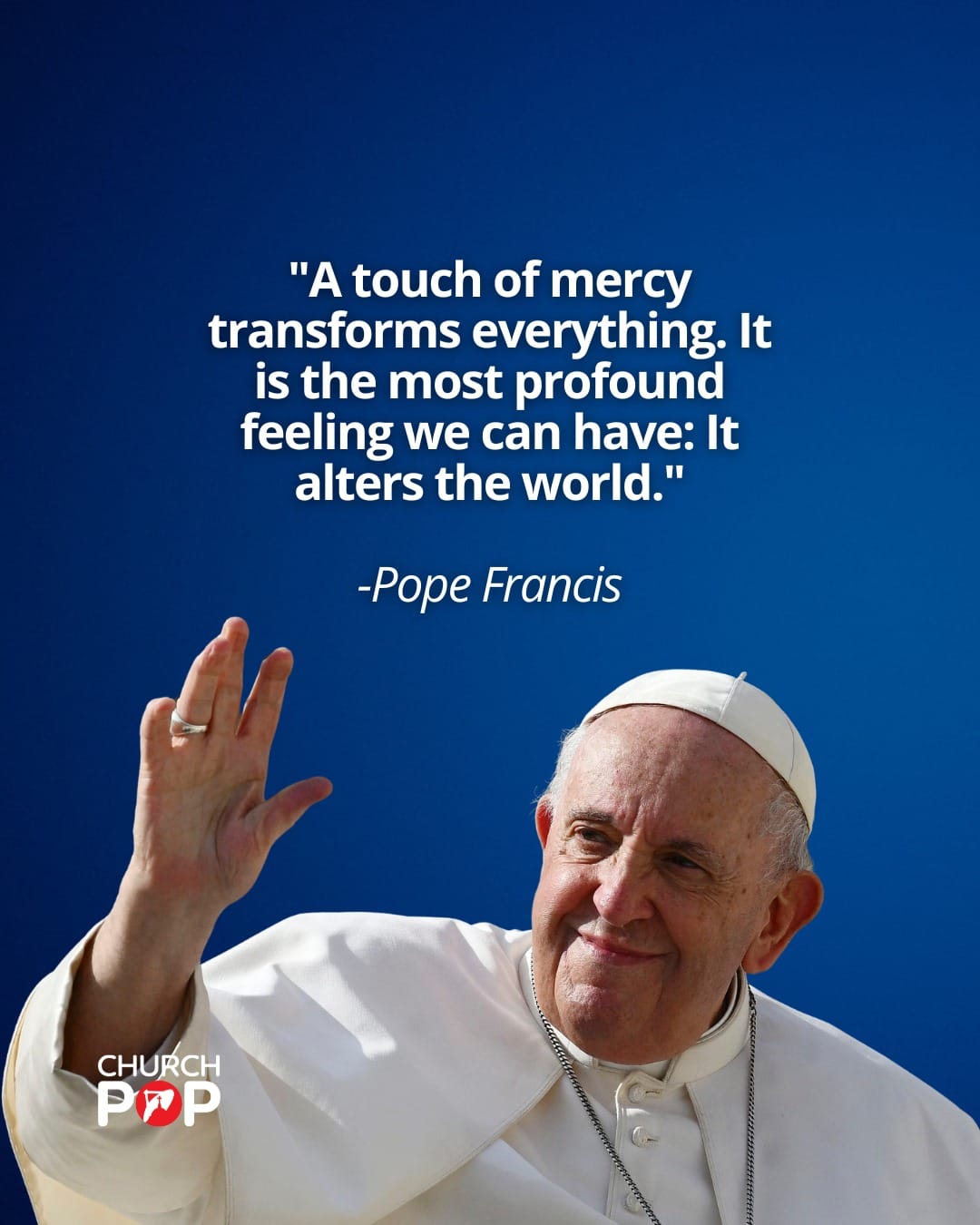 Caroline Perkins, ChurchPOP"A touch of mercy transforms everything. It is the most profound feeling we can have: It alters the world." (First Angelus prayer, March 17, 2013)
Caroline Perkins, ChurchPOP"A touch of mercy transforms everything. It is the most profound feeling we can have: It alters the world." (First Angelus prayer, March 17, 2013)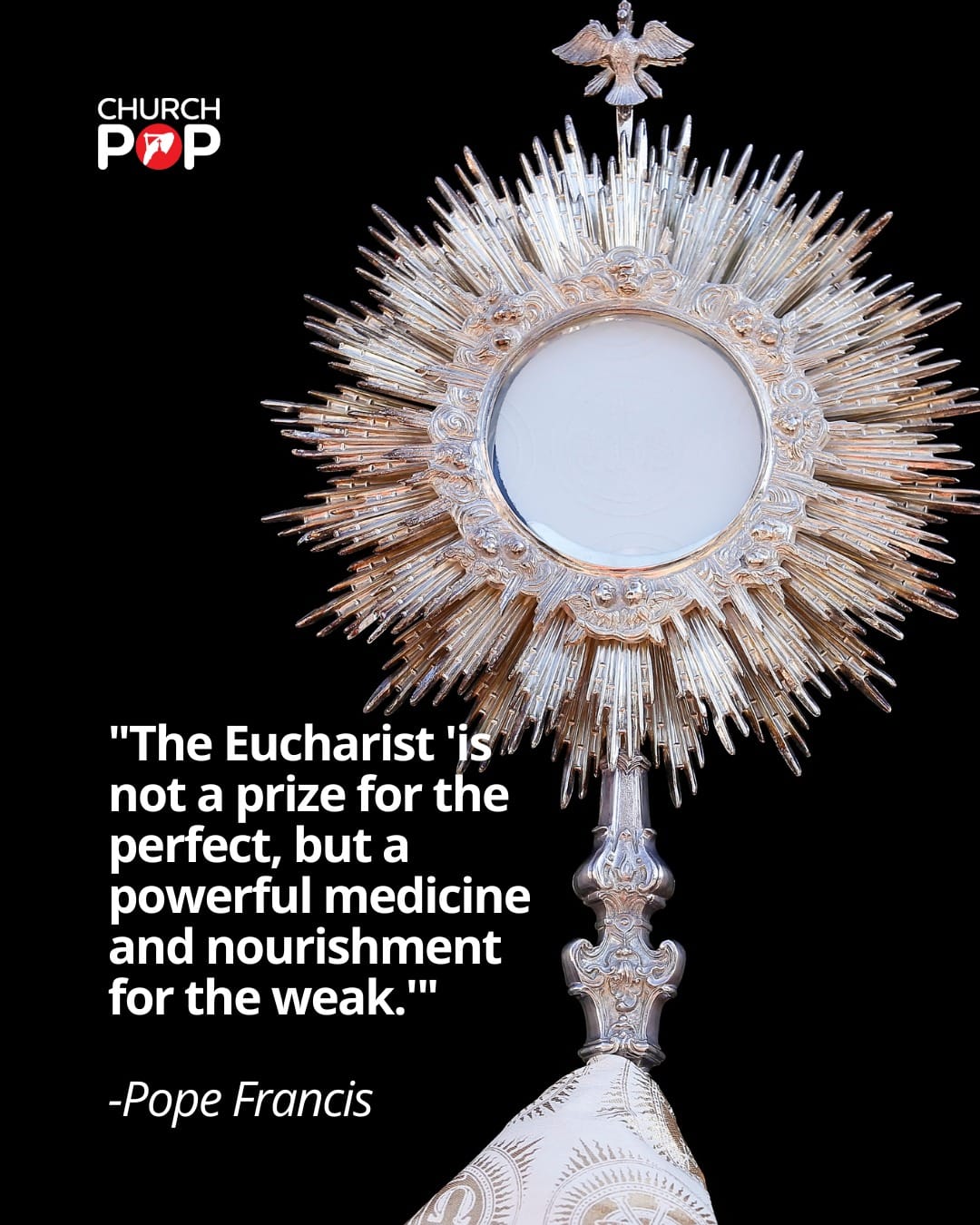 Caroline Perkins, ChurchPOP"The Eucharist 'is not a prize for the perfect, but a powerful medicine and nourishment for the weak.'" (Amoris Laetitia, April 8, 2016)
Caroline Perkins, ChurchPOP"The Eucharist 'is not a prize for the perfect, but a powerful medicine and nourishment for the weak.'" (Amoris Laetitia, April 8, 2016) Caroline Perkins, ChurchPOP"Dear young people, do not be afraid of making decisive choices in life. Have faith; the Lord will not abandon you!"
Caroline Perkins, ChurchPOP"Dear young people, do not be afraid of making decisive choices in life. Have faith; the Lord will not abandon you!"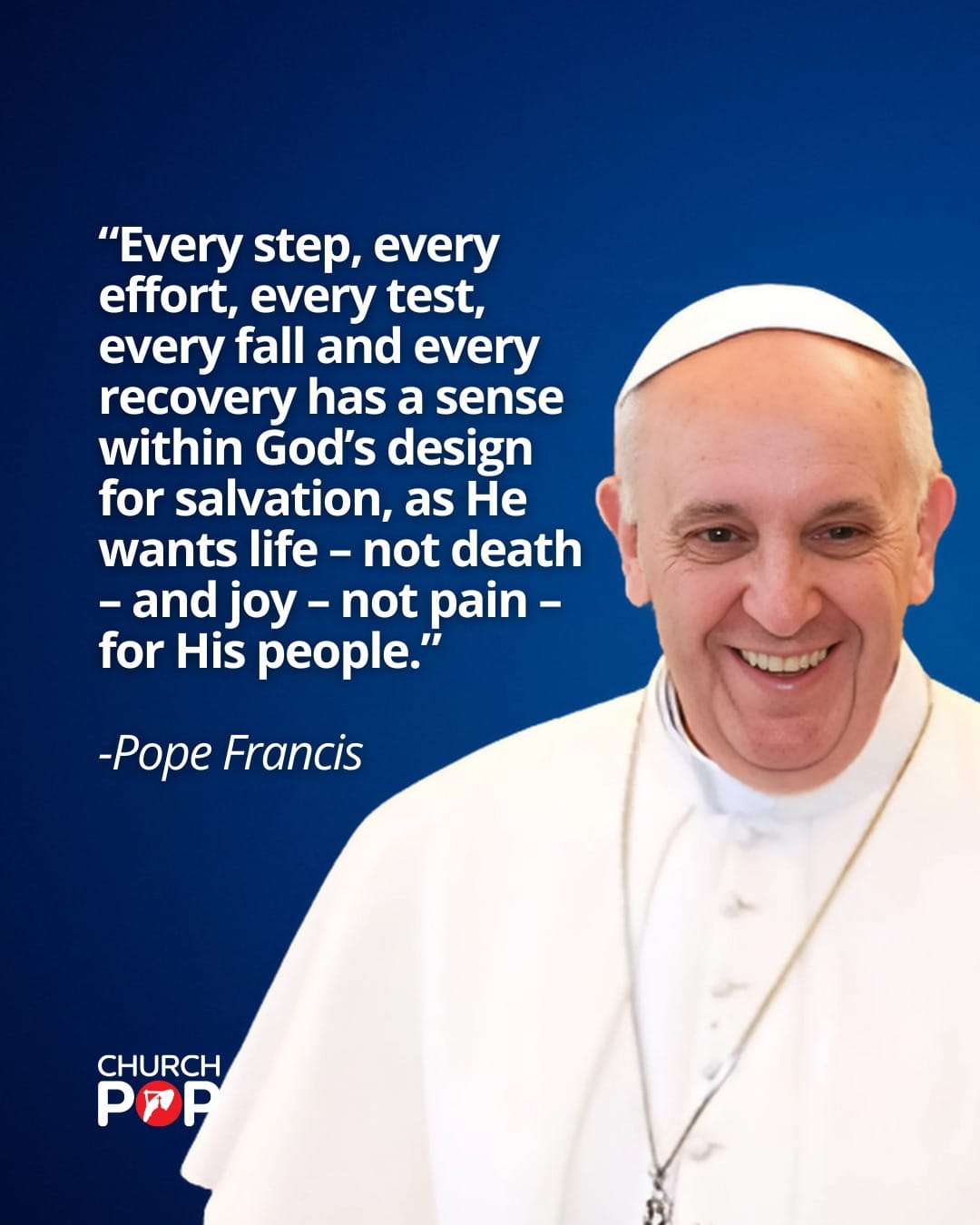 Caroline Perkins, ChurchPOP“Every step, every effort, every test, every fall and every recovery has a sense within God’s design for salvation, as He wants life – not death – and joy – not pain – for His people.” (Ash Wednesday General Audience, 2017)
Caroline Perkins, ChurchPOP“Every step, every effort, every test, every fall and every recovery has a sense within God’s design for salvation, as He wants life – not death – and joy – not pain – for His people.” (Ash Wednesday General Audience, 2017)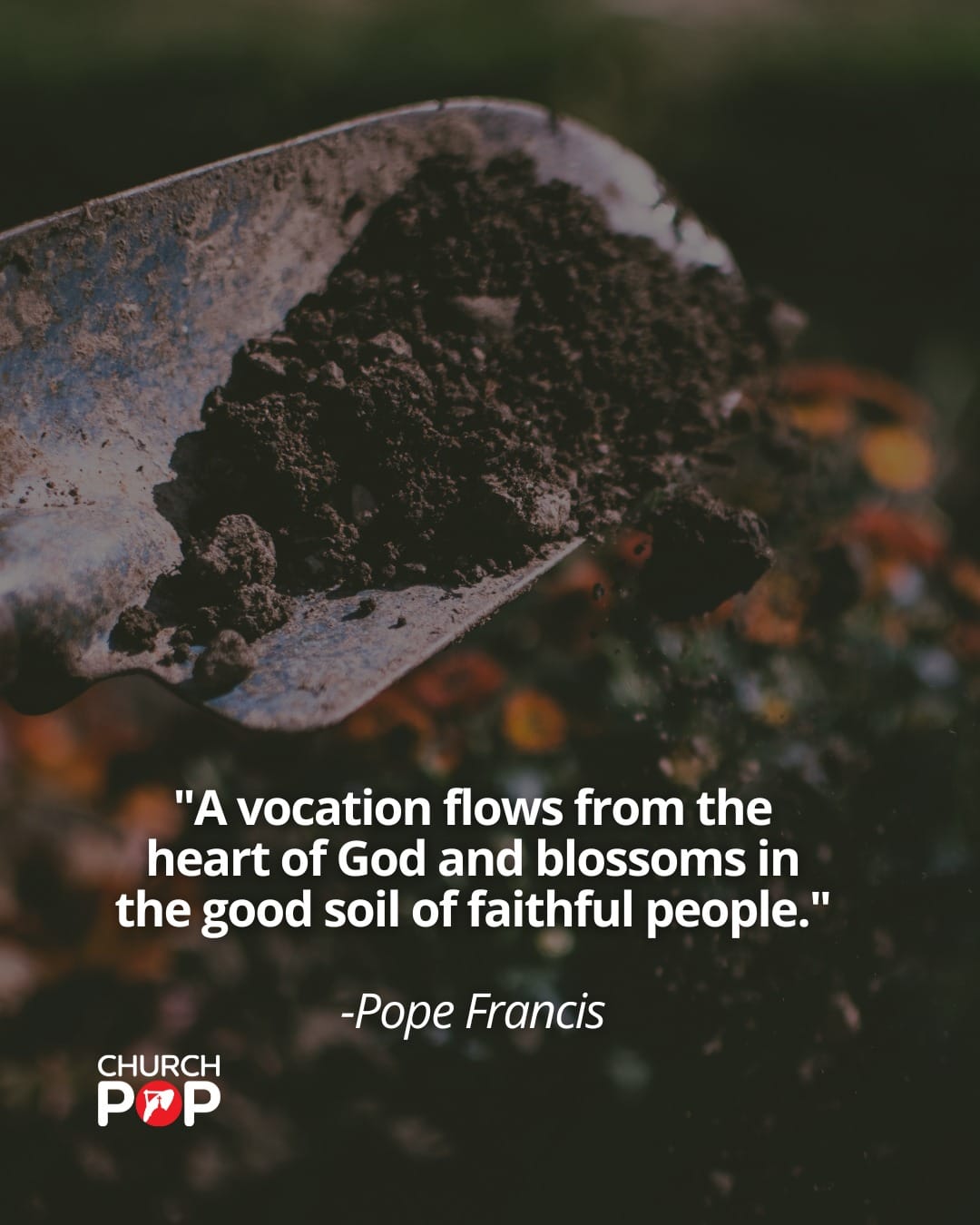 Caroline Perkins, ChurchPOP"A vocation flows from the heart of God and blossoms in the good soil of faithful people." (World Day of Prayer for Vocations 2014)
Caroline Perkins, ChurchPOP"A vocation flows from the heart of God and blossoms in the good soil of faithful people." (World Day of Prayer for Vocations 2014)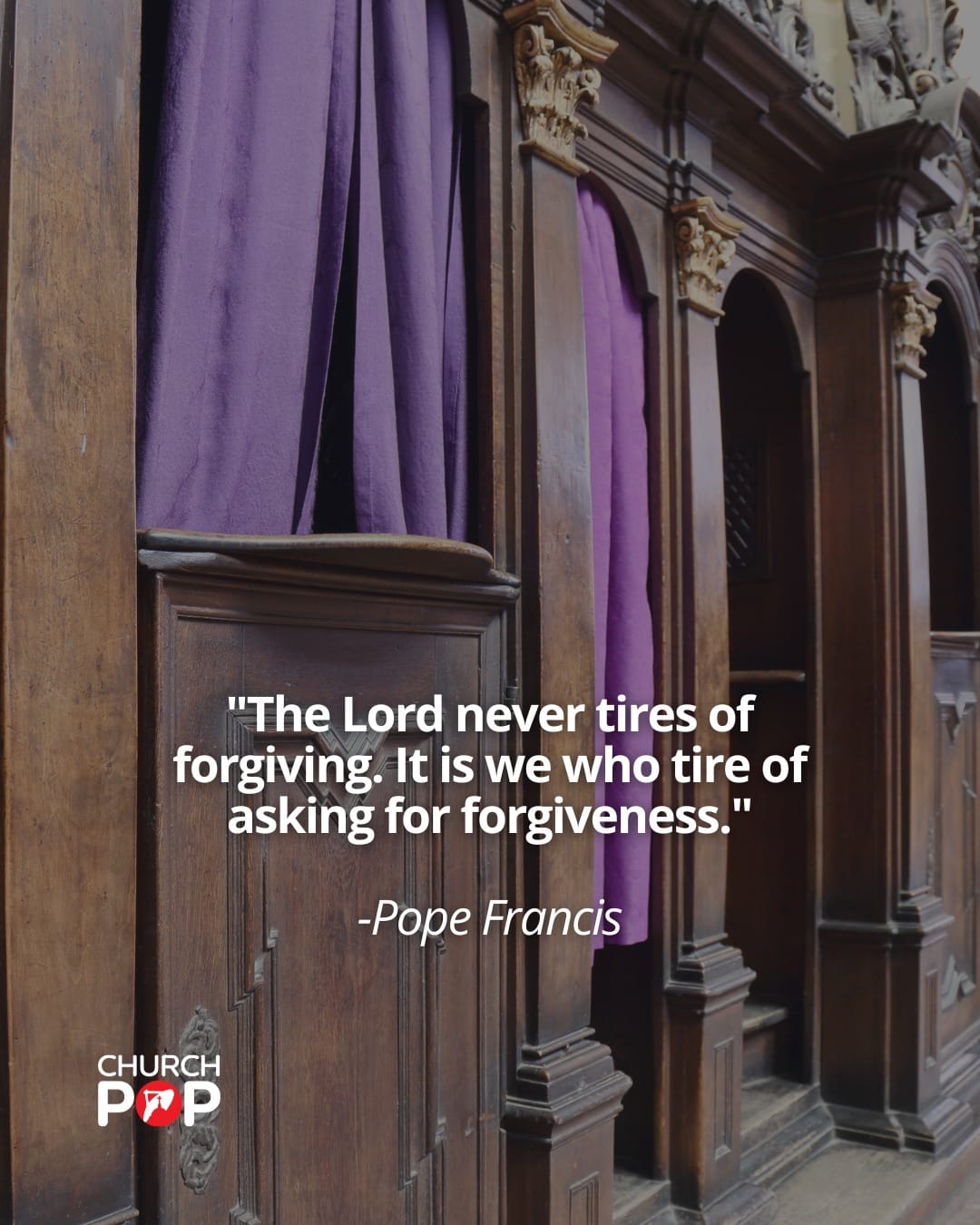 Caroline Perkins, ChurchPOP"The Lord never tires of forgiving. It is we who tire of asking for forgiveness."
Caroline Perkins, ChurchPOP"The Lord never tires of forgiving. It is we who tire of asking for forgiveness."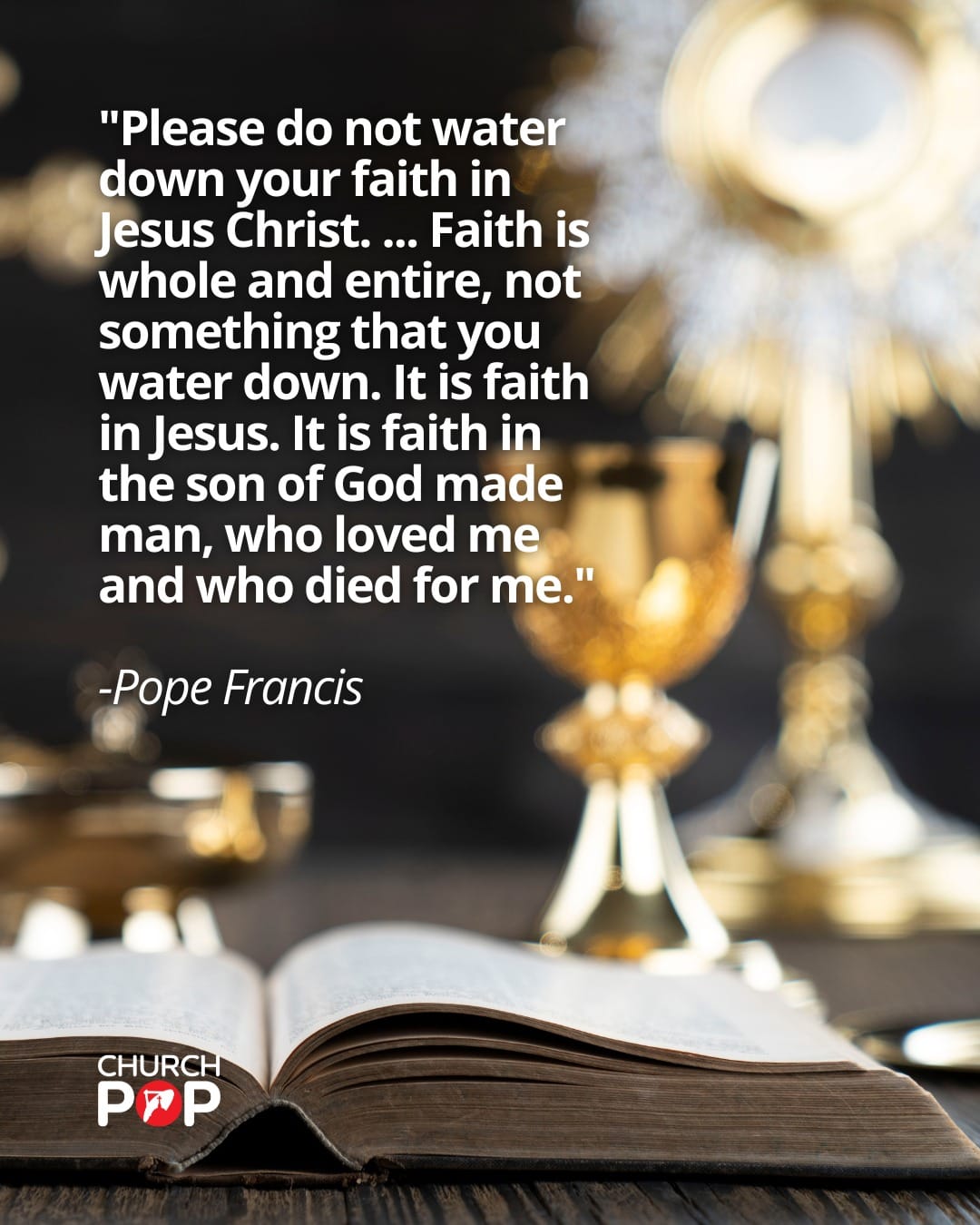 Caroline Perkins, ChurchPOP"Please do not water down your faith in Jesus Christ. ... Faith is whole and entire, not something that you water down. It is faith in Jesus. It is faith in the son of God made man, who loved me and who died for me." (World Youth Day, July 25, 2013)
Caroline Perkins, ChurchPOP"Please do not water down your faith in Jesus Christ. ... Faith is whole and entire, not something that you water down. It is faith in Jesus. It is faith in the son of God made man, who loved me and who died for me." (World Youth Day, July 25, 2013)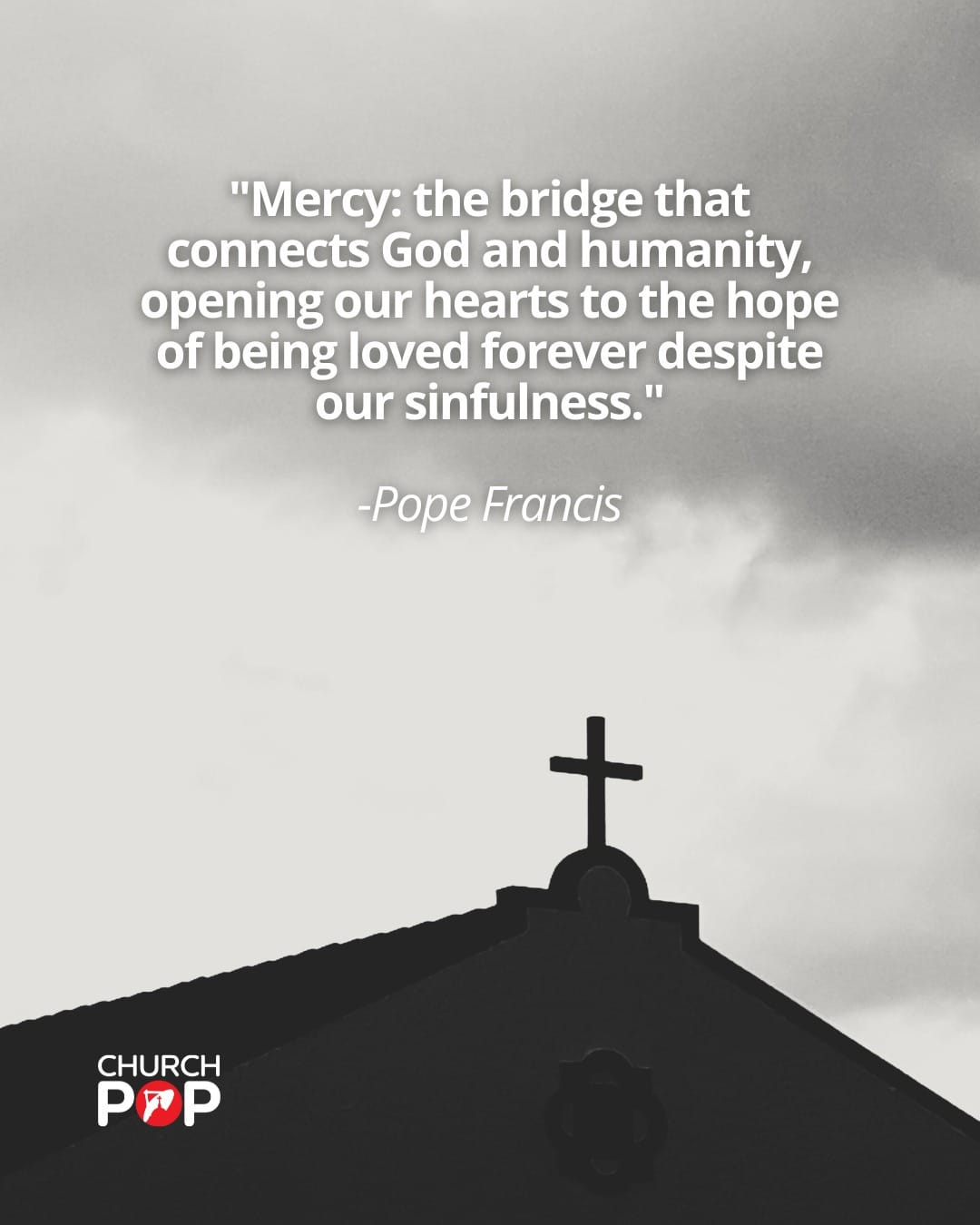 Caroline Perkins, ChurchPOP"Mercy: the bridge that connects God and humanity, opening our hearts to the hope of being loved forever despite our sinfulness." (Misericordiae Vultus, April 11, 2015)
Caroline Perkins, ChurchPOP"Mercy: the bridge that connects God and humanity, opening our hearts to the hope of being loved forever despite our sinfulness." (Misericordiae Vultus, April 11, 2015)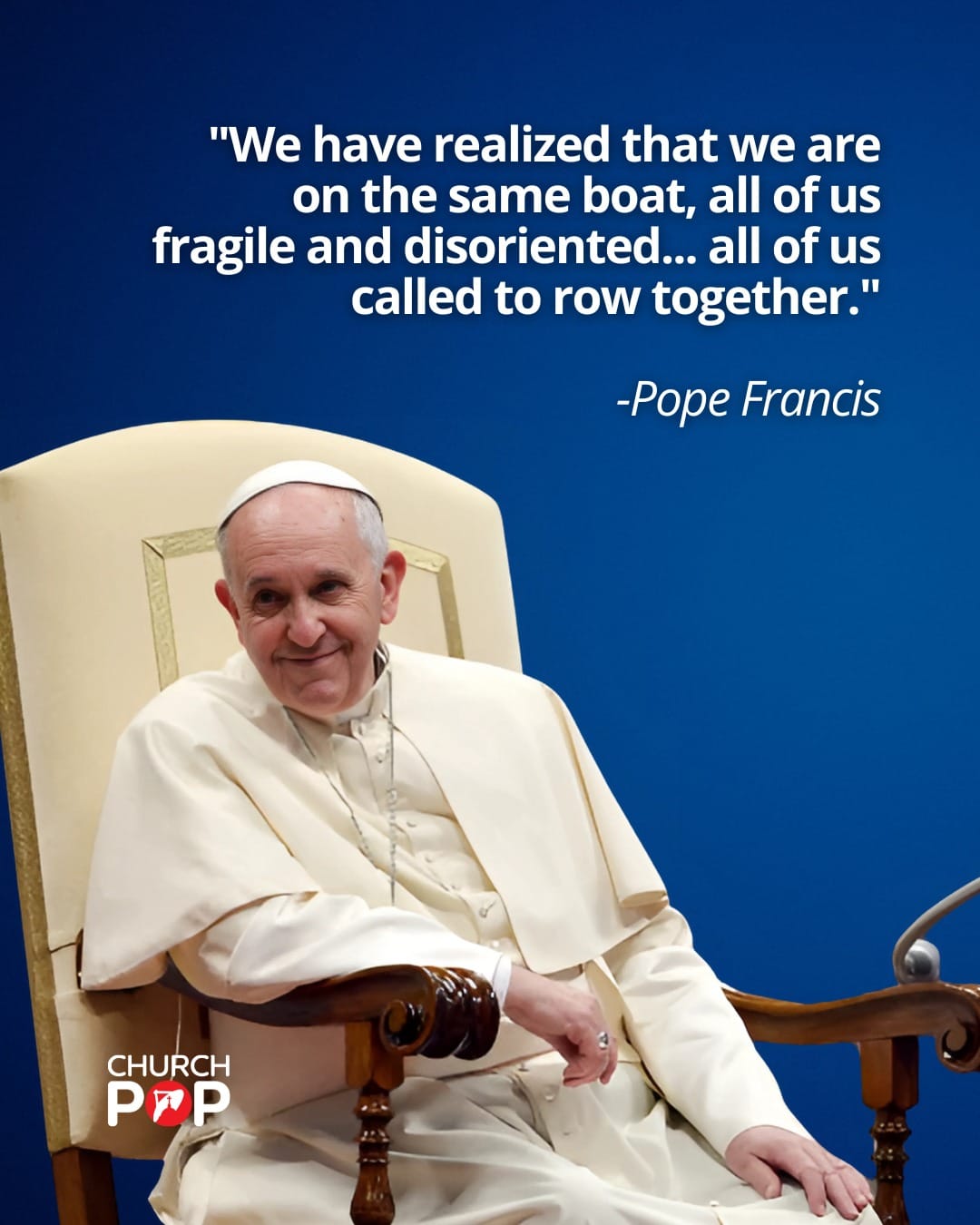 Caroline Perkins, ChurchPOP"We have realized that we are on the same boat, all of us fragile and disoriented... all of us called to row together." (Prayer during COVID-19 pandemic, March 27, 2020)
Caroline Perkins, ChurchPOP"We have realized that we are on the same boat, all of us fragile and disoriented... all of us called to row together." (Prayer during COVID-19 pandemic, March 27, 2020)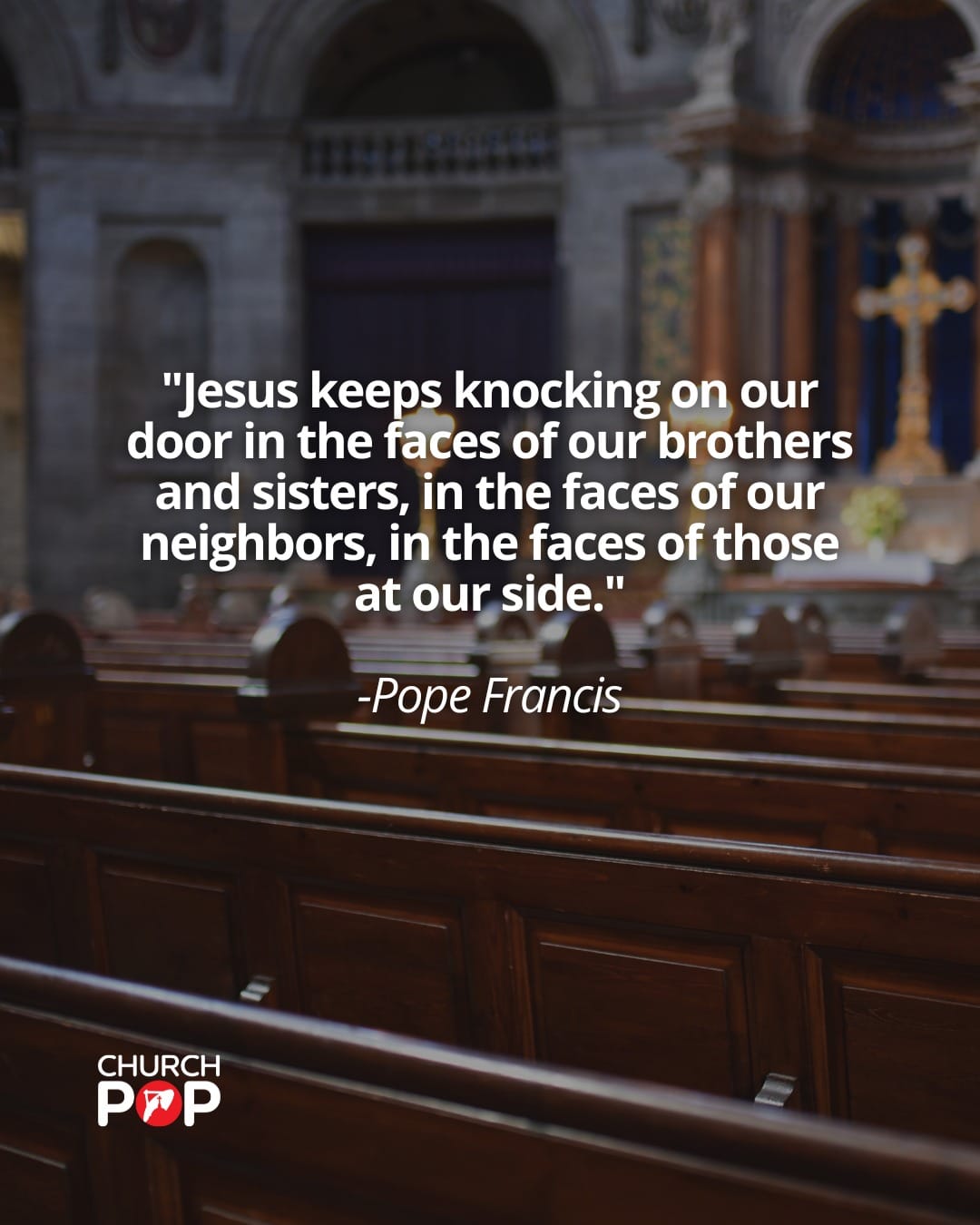 Caroline Perkins, ChurchPOP"Jesus keeps knocking on our door in the faces of our brothers and sisters, in the faces of our neighbors, in the faces of those at our side."
Caroline Perkins, ChurchPOP"Jesus keeps knocking on our door in the faces of our brothers and sisters, in the faces of our neighbors, in the faces of those at our side."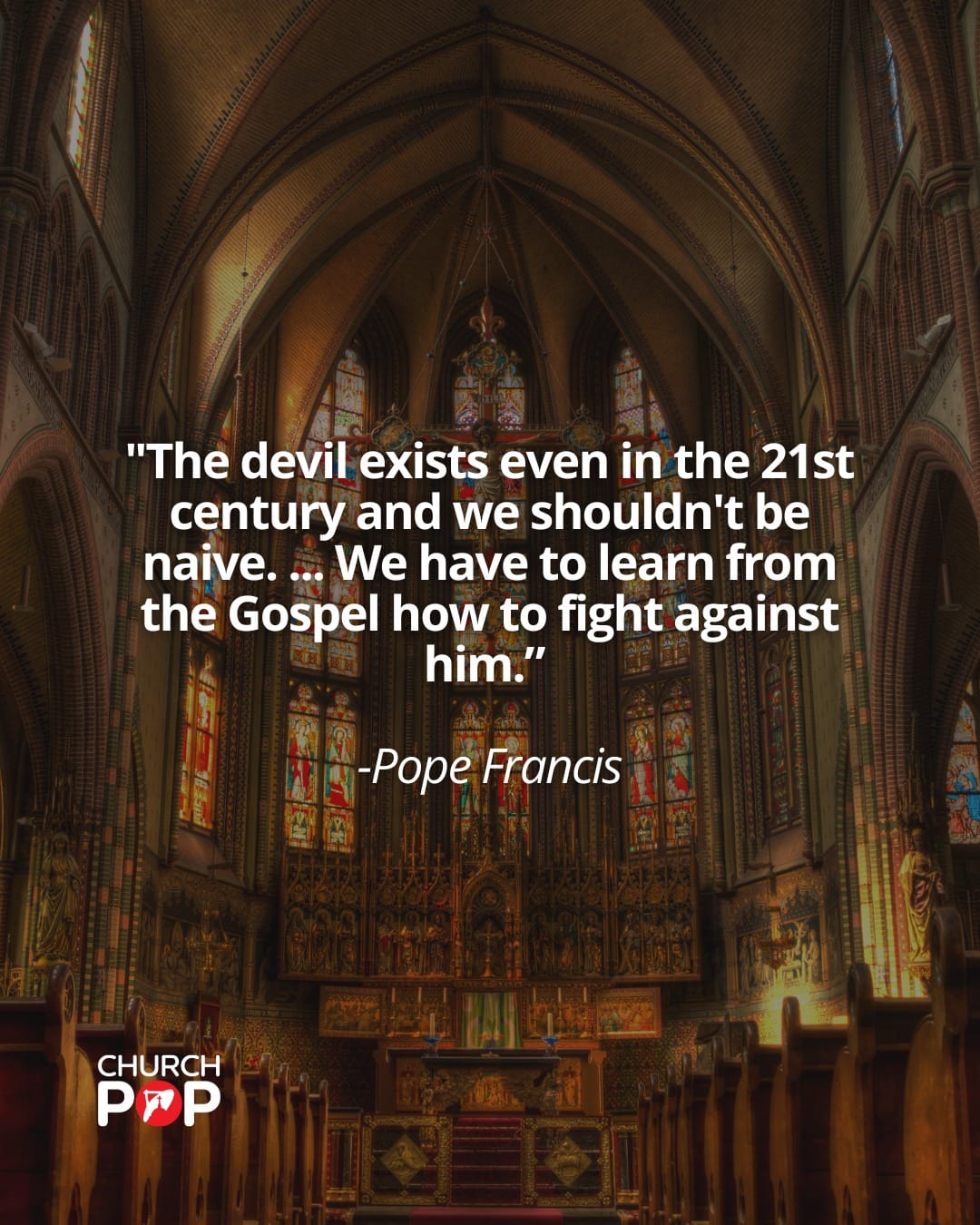 Caroline Perkins, ChurchPOP"The devil exists even in the 21st century and we shouldn't be naive. ... We have to learn from the Gospel how to fight against him.” (Homily, April 11, 2014)
Caroline Perkins, ChurchPOP"The devil exists even in the 21st century and we shouldn't be naive. ... We have to learn from the Gospel how to fight against him.” (Homily, April 11, 2014)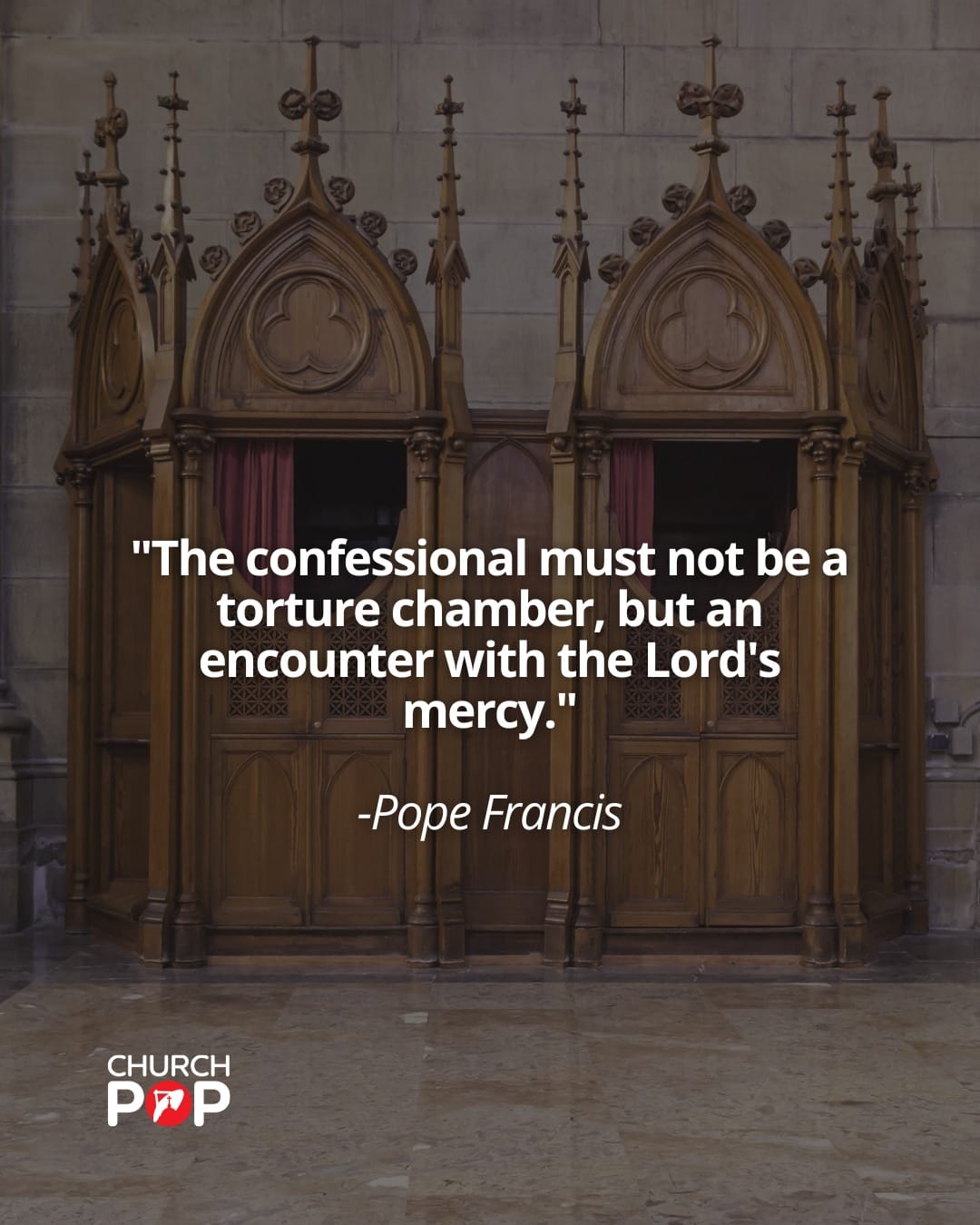 Caroline Perkins, ChurchPOP"The confessional must not be a torture chamber, but an encounter with the Lord's mercy." (Amoris Laetitia, April 8, 2016)
Caroline Perkins, ChurchPOP"The confessional must not be a torture chamber, but an encounter with the Lord's mercy." (Amoris Laetitia, April 8, 2016)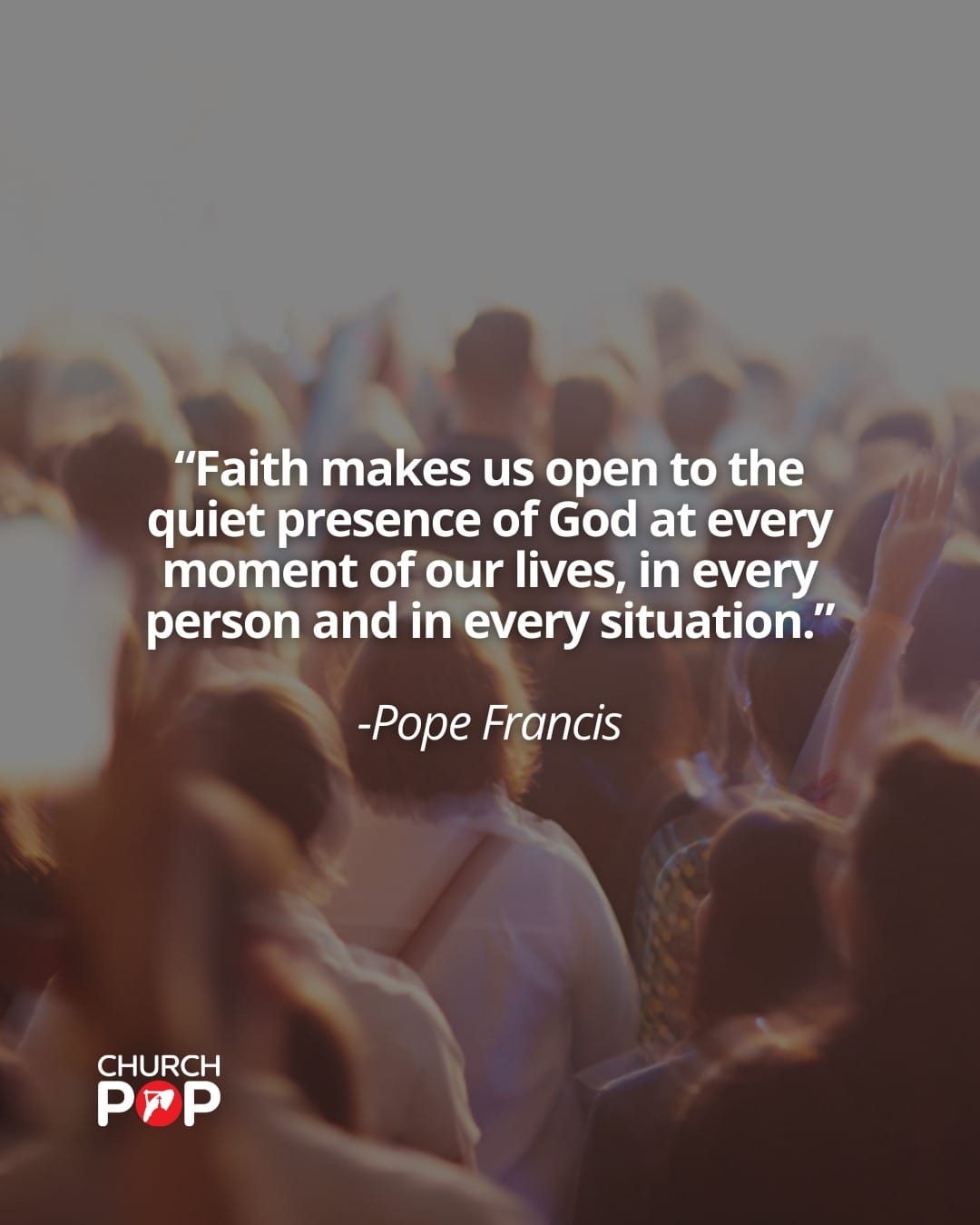 Caroline Perkins, ChurchPOP“Faith makes us open to the quiet presence of God at every moment of our lives, in every person and in every situation.” (Cuba/U.S. Visit, 2015)
Caroline Perkins, ChurchPOP“Faith makes us open to the quiet presence of God at every moment of our lives, in every person and in every situation.” (Cuba/U.S. Visit, 2015)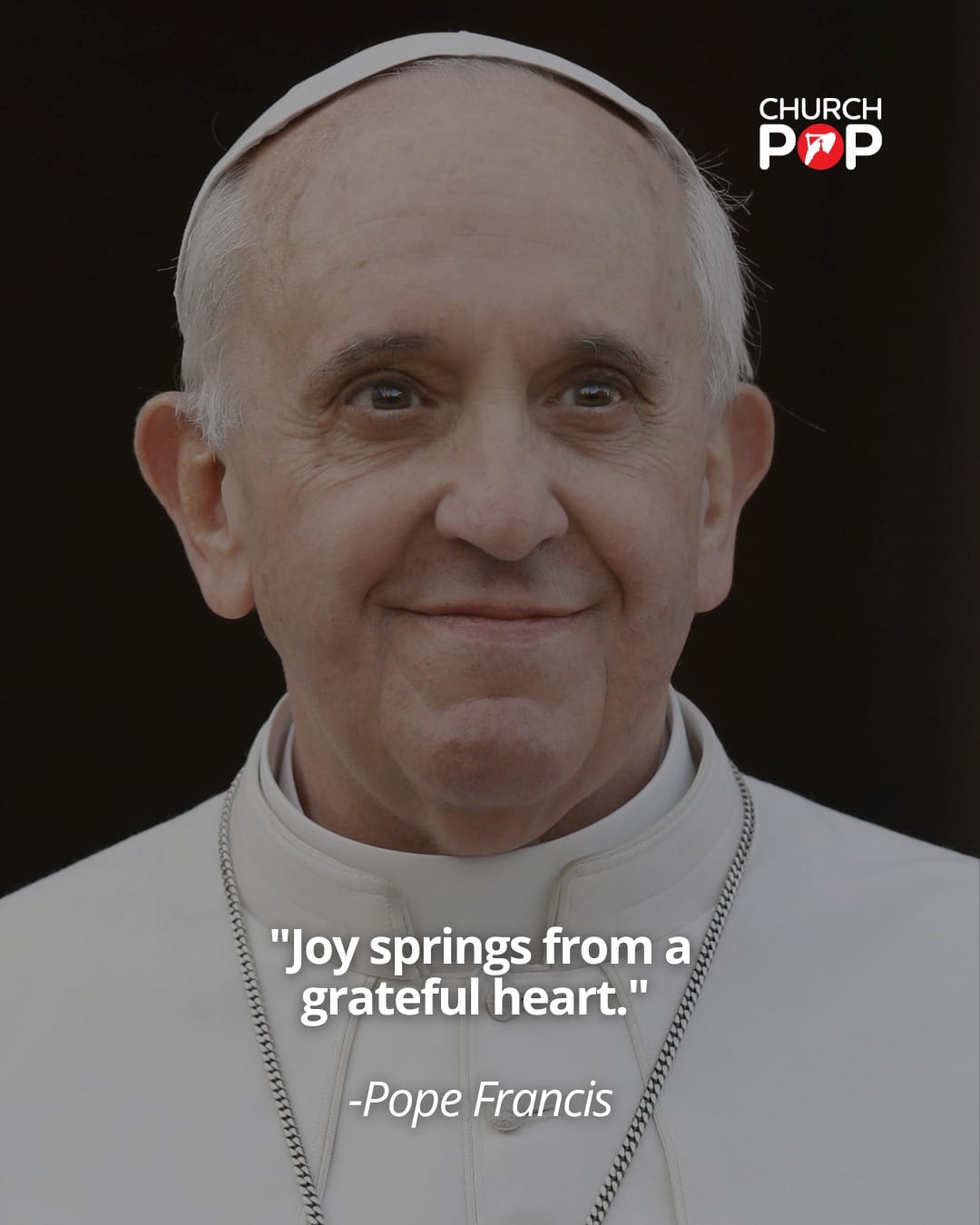 Caroline Perkins, ChurchPOP"Joy springs from a grateful heart." (Sept. 23, 2015)
Caroline Perkins, ChurchPOP"Joy springs from a grateful heart." (Sept. 23, 2015)Prayer for a Deceased Pope
God, Who, in Thine ineffable providence, didst will that Thy servant Francis ... should be numbered among the high priests; grant, we beseech Thee, that he, who on earth held the place of Thine only-begotten Son, may be joined forevermore to the fellowship of Thy holy pontiffs. Through the same Jesus Christ, Thy Son, Who liveth and reigneth with Thee in the unity of the Holy Spirit, God, world without end. Amen.
Source: Roman Missal
-
Site: PeakProsperityHere's another Fat Pipe for your smoking pleasure!
-
Site: OnePeterFive

A few months ago I asked my spiritual father the following question. This is a questioned that has burned in me for years since I took over the editorship of OnePeterFive. It is a question that has troubled by conscience and caused me to lose a great deal of sleep. Here’s the question: My spiritual father responded with this wisdom: And so, as an act of humility and love for…
-
Site: Mises InstituteThe ruling classes and their media blamed the 2008 financial crisis on free markets and too little government regulation. However, because the Federal Reserve promised to help cover losses in financial markets, it practically invited reckless behavior.
-
Site: southern orders
I had forgotten that this video existed. But today, someone posted it on their facebook. So here it is!
-
Site: Catholic Herald
The Holy Father has died at the age of 88. Pope Francis went to his eternal reward at 7.35 am Rome time at his residence in the Vatican’s Casa Santa Marta.
Cardinal Kevin Farrell, Camerlengo of the Holy Roman Church, released the following statement: “At 7.35 this morning (local time), the Bishop of Rome, Francis, returned to the house of the Father. His entire life was dedicated to the service of the Lord and His Church. He taught us to live the values of the Gospel with fidelity, courage and universal love, especially in favour of the poorest and most marginalised. With immense gratitude for his example as a true disciple of the Lord Jesus, we commend the soul of Pope Francis to the infinite merciful love of the One and Triune God.”
A pope of many firsts, he was the first Jesuit pope, the first pope from the Americas, and the first from the southern hemisphere. He was also the first non-European pontiff since Gregory III.
On February 14, he was admitted to Gemelli Hospital with bronchitis. On February 22, he experienced a respiratory crisis, and his condition was deemed critical. On February 23, he was diagnosed with early-stage kidney failure, further complicating his recovery. On February 28, he suffered a bronchial spasm, and on March 3 he had two serious episodes in which he struggled to breathe and doctors had to clear mucus from his lungs. On March 23, he was discharged from hospital after a five-week stay and continued his recovery at Domus Sanctae Marthae (St Martha’s House) in Vatican City, with instructions to rest.
He seemed to be making a remarkable recovery, and appeared multiple times to greet crowds, despite being advised by doctors to observe a two-month period of rest. His last public appearance was on April 20, Easter Sunday, when he delivered the Urbi et Orbi Easter blessing.
His final message to the world, characteristically, called for peace. Referencing the Israel-Hamas conflict, he said: “Call a ceasefire, release the hostages and come to the aid of a starving people that aspires to a future of peace.”
Italy’s Prime Minister, Giorgia Meloni, was one of the first world leaders to pay tribute, stating: “This news saddens us deeply. I had the privilege of enjoying his friendship. He asked the world, once again, for the courage to change direction, to follow a path that does not destroy, but cultivates, repairs, protects.
“His teachings and his legacy will not be lost. We greet the Holy Father with hearts full of sadness, but we know that he is now in the peace of the Lord.”
Cardinal Vincent Nichols, President of the Catholic Bishops’ Conference of England and Wales and Archbishop of Westminster, released the following statement:
“The death of Pope Francis brings great sadness to so many around the world, both within the Catholic Church and in societies in general. A voice proclaiming the innate dignity of every human being, especially those who are poor or marginalised, is now silent. The legacy he leaves is one we must seek to carry forward and strengthen.
“Pope Francis was called to priesthood through his experience of the mercy and compassion of God. This remained the core of his ministry, as Priest, Bishop and Pontiff. Only in understanding the love and mercy of God towards each one of us can we fashion societies and communities that bear the mark of the ‘kingdom of God’.
“This same focus and emphasis lay at this desire to see membership of the Church as being rooted in ‘missionary discipleship’, a dynamic and powerful vision for every Christian and every community.
“Now we pray for the repose of his soul, that he may know, in full measure, the merciful and loving embrace of the Father, of the one God to whom he gave his life in unstinting service.
“May he now rest in peace and rise in glory.”His Majesty the King later added his own voice to the tributes, saying: “My wife and I were most deeply saddened to learn of the death of Pope Francis. Our heavy hearts have been somewhat eased, however, to know that His Holiness was able to share an Easter Greeting with the Church and the world he served with such devotion throughout his life and ministry.
“His Holiness will be remembered for his compassion, his concern for the unity of the Church and for his tireless commitment to the common causes of all people of faith, and to those of goodwill who work for the benefit of others.
“His belief that care for Creation is an existential expression of faith in God resounded with so many across the world. Through his work and care for both people and planet, he profoundly touched the lives of so many.”
Sir Keir Starmer, Prime Minister of the United Kingdom, said that “Pope Francis was a pope for the poor, the downtrodden and the forgotten. He was close to the realities of human fragility, meeting Christians around the world facing war, famine, persecution and poverty. Yet he never lost the faith-fuelled hope of a better world.
“That hope was at the heart of his papacy. His determination to visibly live out his faith inspired people across the world to see afresh the church’s teachings of mercy and charity. With his death, we are reminded once more of his call to care for one another across different faiths, backgrounds, nations and beliefs.”
US President Donald Trump, whose relationship with the Vatican has been strained in recent months, was brief in his tribute, writing: “Rest in peace Pope Francis! May God bless him and all who loved him!” His vice president JD Vance, however, who met Pope Francis the day before he died, wrote at more length.
Writing on X, he wrote: “I just learned of the passing of Pope Francis. My heart goes out to the millions of Christians all over the world who loved him. I was happy to see him yesterday, though he was obviously very ill… May God rest his soul.”

The post Pope Francis dies at the Vatican, aged 88 first appeared on Catholic Herald.
The post Pope Francis dies at the Vatican, aged 88 appeared first on Catholic Herald.
-
Site: Henrymakow.com
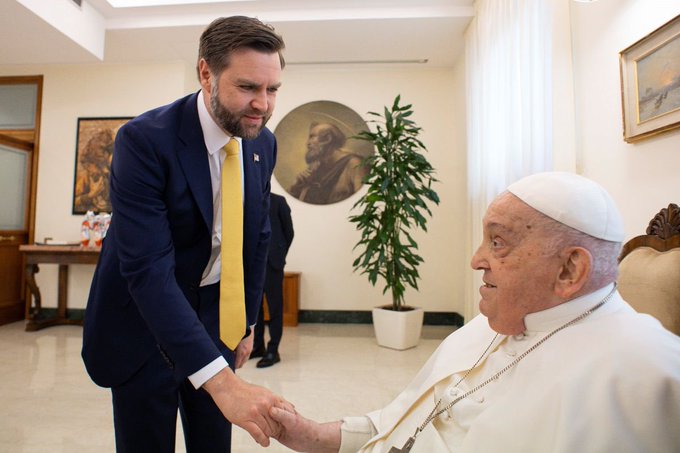 (left, Satanists. JD Vance & Pope Francis, signal their loyalty to Lucifer. Francis dies 24 hrs. later.)Humanity is prisoner of a satanic cultthat is fulfilling Biblical End Times Prophecyrequiring a nuclear catastrophe as a prerequisitefor the return of the "Jewish Messiah."The cult is called Chabad.Trump, Putin and Satanyahu are members.All world wars are preplanned and instigated by Freemasonsembedded on both sides with the aim of depopulationand destroying Christian civilization.Disclaimer- Normally I abhor repetition but since no one is paying any attention, it doesn't matter.Klaus Schwab Steps Down From WEF Board, Pope Dies, Amid Globalist Retreat"On the same day Pope Francis--known for his inclusive beliefs--passed away, another globalist fell: Klaus Schwab, the architect of the World Economic Forum's dystopian agenda, announced he was stepping down from the WEF board. It marks the end of an era for Schwab, who championed radical wokeness, bug eating, mass vaccination campaigns, population control, and climate de-growth policies through what often resembled digital communism--social credit scores, central bank digital currencies, and many more China-like policies. Meanwhile, cultural shifts across the Americas signal a rising movement toward traditional values, sending the WEF's ideology into a tailspin.Michael Hoffman - Another Papal Criminal Passes into History
(left, Satanists. JD Vance & Pope Francis, signal their loyalty to Lucifer. Francis dies 24 hrs. later.)Humanity is prisoner of a satanic cultthat is fulfilling Biblical End Times Prophecyrequiring a nuclear catastrophe as a prerequisitefor the return of the "Jewish Messiah."The cult is called Chabad.Trump, Putin and Satanyahu are members.All world wars are preplanned and instigated by Freemasonsembedded on both sides with the aim of depopulationand destroying Christian civilization.Disclaimer- Normally I abhor repetition but since no one is paying any attention, it doesn't matter.Klaus Schwab Steps Down From WEF Board, Pope Dies, Amid Globalist Retreat"On the same day Pope Francis--known for his inclusive beliefs--passed away, another globalist fell: Klaus Schwab, the architect of the World Economic Forum's dystopian agenda, announced he was stepping down from the WEF board. It marks the end of an era for Schwab, who championed radical wokeness, bug eating, mass vaccination campaigns, population control, and climate de-growth policies through what often resembled digital communism--social credit scores, central bank digital currencies, and many more China-like policies. Meanwhile, cultural shifts across the Americas signal a rising movement toward traditional values, sending the WEF's ideology into a tailspin.Michael Hoffman - Another Papal Criminal Passes into History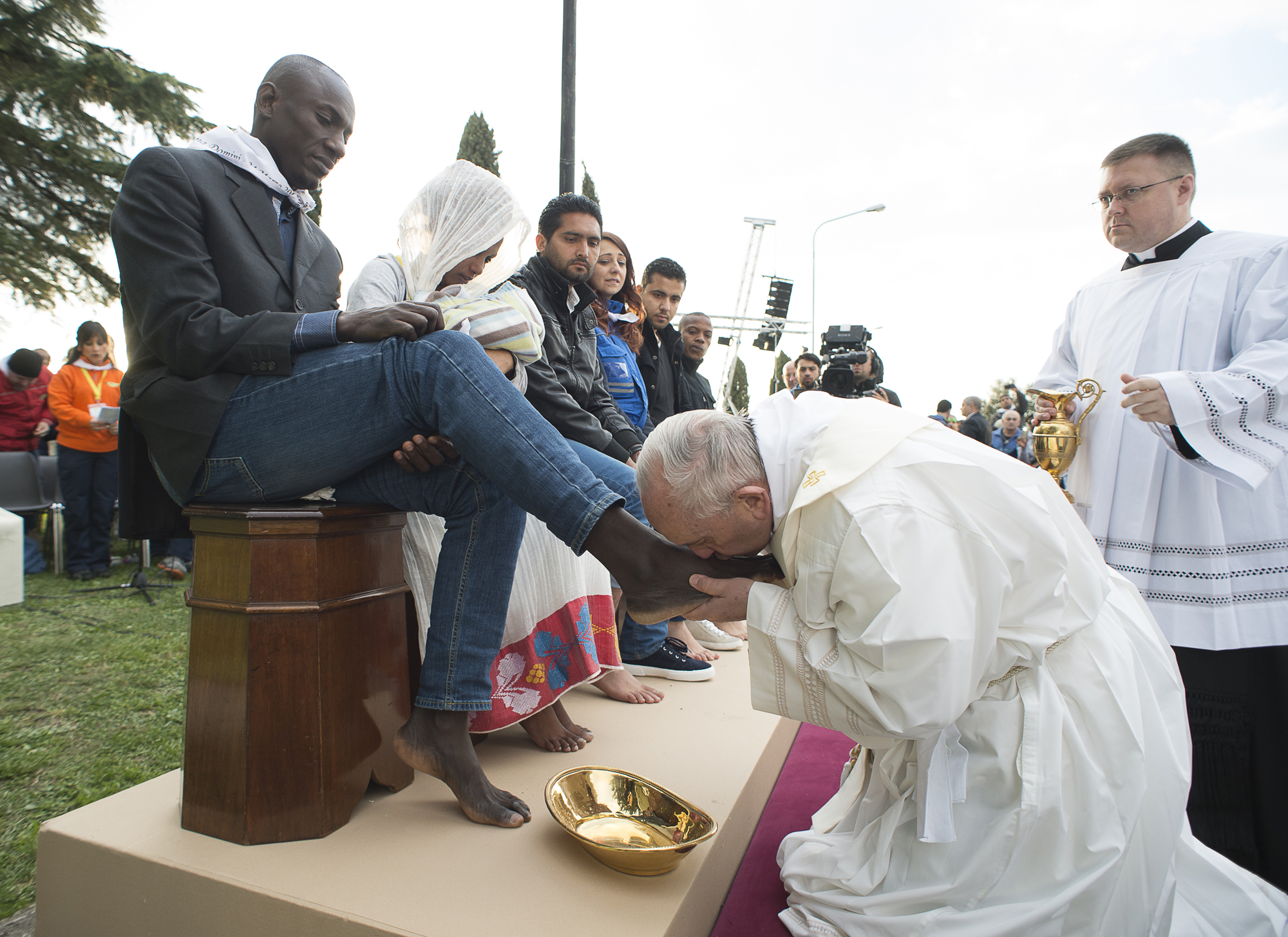 Left, reverse racistSusan-POPE FRANCIS DEAD ON MONDAY PAST EASTER"Well here's my tweet from almost 18 months ago and it certainly aged well. For comprehensive information and historical accounting of who this person was, I refer you to Brother Alexis Bugnolo, American Expat living in Rome, Franciscan Monk who has been on the Dr Jane Ruby Show many times, Good riddance, now you face the only real Judge, our Lord above. Wonder who the next C I A instalment will be? "-Mike Adams--Trump puts America on the path of ECONOMIC SUICIDE"Trump just announced new penalties for cargo ships docking with U.S. ports, stating that if the ship itself was originally made in China, there will be another 1.5 million dollar fee on top of the insane tariffs already announced.This is causing Chinese factories to literally abandon goods in transit, forfeiting entire container loads of goods destined for the U.S.The cargo shipping companies will be forced to redirect those loads to Mexico or South America, flooding those countries with low-cost Chinese goods while America's shelves run empty and shocking levels of supply chain scarcity kick in. You are about to find yourself living in a third world country. Right here in America."-
Left, reverse racistSusan-POPE FRANCIS DEAD ON MONDAY PAST EASTER"Well here's my tweet from almost 18 months ago and it certainly aged well. For comprehensive information and historical accounting of who this person was, I refer you to Brother Alexis Bugnolo, American Expat living in Rome, Franciscan Monk who has been on the Dr Jane Ruby Show many times, Good riddance, now you face the only real Judge, our Lord above. Wonder who the next C I A instalment will be? "-Mike Adams--Trump puts America on the path of ECONOMIC SUICIDE"Trump just announced new penalties for cargo ships docking with U.S. ports, stating that if the ship itself was originally made in China, there will be another 1.5 million dollar fee on top of the insane tariffs already announced.This is causing Chinese factories to literally abandon goods in transit, forfeiting entire container loads of goods destined for the U.S.The cargo shipping companies will be forced to redirect those loads to Mexico or South America, flooding those countries with low-cost Chinese goods while America's shelves run empty and shocking levels of supply chain scarcity kick in. You are about to find yourself living in a third world country. Right here in America."- In a new act of incitement led by colonial organizations and extremist hardliners, radical Hebrew platforms have published an AI-generated video depicting the destruction of Al-Aqsa Mosque and the construction of the so-called Third Temple, under the title: "Next Year in Jerusalem."Thomas Stone- Trump's economic policies; "uncertainty" and a falling dollar are proving successfulTrump and "uncertainty"Don't believe the deceptive government statistics. CCP China is getting destroyed under an avalanche of fake government economic data. A quick look at the falling US dollar index indicates that the Trump regime is getting what it wants. Why wait for the Rothschild hireling Fed Chair Powell to act when the Trump regime can begin responding proactively on its own?To wit, I present you with Exhibit A; the tanking USDX. By talking down the dollar, Trump achieves a lot. Who says "uncertainty" is a bad thing?---The Persecution of Dr. Reiner Fuellmich:The biggest judicial scandal ever seen in GermanyThanks to his brilliant investigative work, and after consulting more than 150 scientists and experts in all fields around the world, as well as numerous whistleblowers (from Pfizer, WHO, CDC, UN), he was able to collect an abundance of evidence of what he calls "the biggest crime ever perpetrated against humanity."
In a new act of incitement led by colonial organizations and extremist hardliners, radical Hebrew platforms have published an AI-generated video depicting the destruction of Al-Aqsa Mosque and the construction of the so-called Third Temple, under the title: "Next Year in Jerusalem."Thomas Stone- Trump's economic policies; "uncertainty" and a falling dollar are proving successfulTrump and "uncertainty"Don't believe the deceptive government statistics. CCP China is getting destroyed under an avalanche of fake government economic data. A quick look at the falling US dollar index indicates that the Trump regime is getting what it wants. Why wait for the Rothschild hireling Fed Chair Powell to act when the Trump regime can begin responding proactively on its own?To wit, I present you with Exhibit A; the tanking USDX. By talking down the dollar, Trump achieves a lot. Who says "uncertainty" is a bad thing?---The Persecution of Dr. Reiner Fuellmich:The biggest judicial scandal ever seen in GermanyThanks to his brilliant investigative work, and after consulting more than 150 scientists and experts in all fields around the world, as well as numerous whistleblowers (from Pfizer, WHO, CDC, UN), he was able to collect an abundance of evidence of what he calls "the biggest crime ever perpetrated against humanity."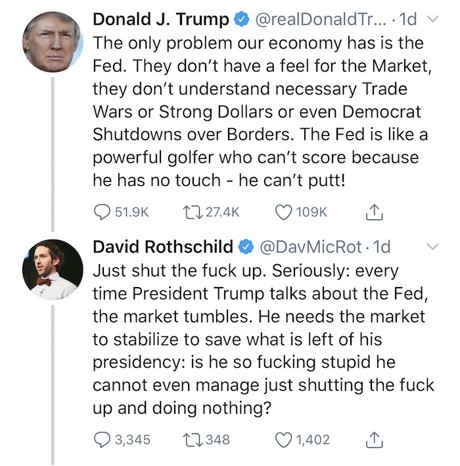 This is from Jan 2019. Could be today.The Pilgrims Society: Subverting American Sovereignty Since 1902EXPOSE: Sir Henry Kissinger--A Mastermind of the Pilgrims Society's Plot to Annex America Into The British EmpireA Sinister Scheme Born in 1902: The Pilgrims Society's Imperial Ambitions Finally Being Dragged Into The Light!Substantial evidence exposes Sir Henry Alfred Kissinger as a central figure in the British Pilgrims Society's audacious plan to subvert American sovereignty and drag the United States back under the yoke of the British Empire. This clandestine operation, rooted in the imperialist vision of Cecil Rhodes, was hatched on July 16, 1902, in London, with its American "branch" established mere months later on January 13, 1903, in New York. For over a century, this shadowy organization has woven a web of influence, with Kissinger at its heart during his most active years, orchestrating a silent coup against the American Republic.-
This is from Jan 2019. Could be today.The Pilgrims Society: Subverting American Sovereignty Since 1902EXPOSE: Sir Henry Kissinger--A Mastermind of the Pilgrims Society's Plot to Annex America Into The British EmpireA Sinister Scheme Born in 1902: The Pilgrims Society's Imperial Ambitions Finally Being Dragged Into The Light!Substantial evidence exposes Sir Henry Alfred Kissinger as a central figure in the British Pilgrims Society's audacious plan to subvert American sovereignty and drag the United States back under the yoke of the British Empire. This clandestine operation, rooted in the imperialist vision of Cecil Rhodes, was hatched on July 16, 1902, in London, with its American "branch" established mere months later on January 13, 1903, in New York. For over a century, this shadowy organization has woven a web of influence, with Kissinger at its heart during his most active years, orchestrating a silent coup against the American Republic.-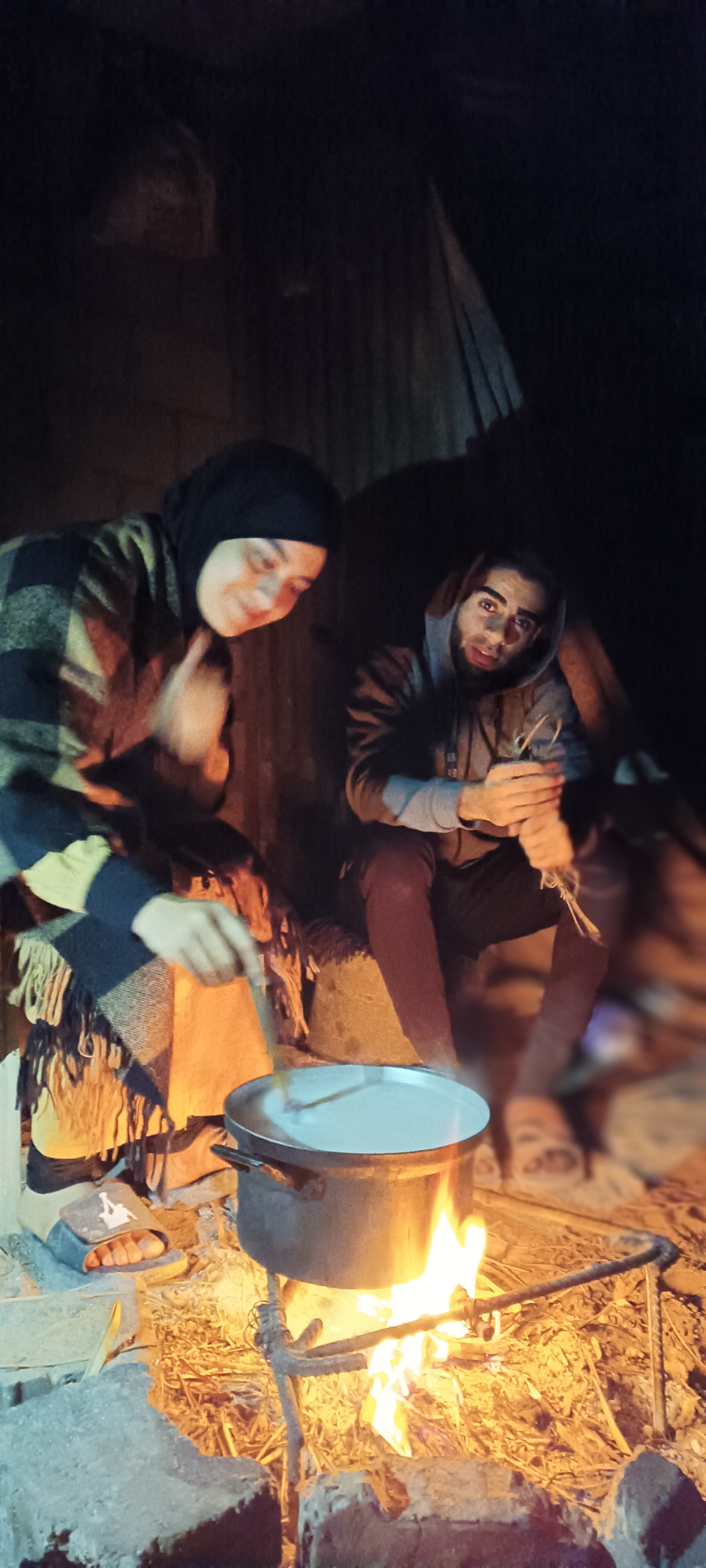 "Tonight we cooked water and milk to satisfy our hunger. The price of a kilo of milk is $36. We bought it thanks to your donations. Thank you always."A Way to Help Gaza-Chinese use AI to mock US sweatshopsJapan Posts Record Population Drop, Shrinking For 14th Year, As Demographic Crisis DeepensJapan's already collapsing population just posted its biggest annual drop on record, falling by 898,000 people as of last October compared to a year earlier, Kyodo News reported.This marked the 14th consecutive year of population decline in the country, according to a government estimate. The previous record drop was 861,000, reported in July 2024.This was the largest demographic drop since 1968.Some more details: according to the Ministry of Internal Affairs and Communications, Japan's total population was 123,802,000, as of October 1, 2024, down by 550,000 or a 0.44% year-on-year decrease.
"Tonight we cooked water and milk to satisfy our hunger. The price of a kilo of milk is $36. We bought it thanks to your donations. Thank you always."A Way to Help Gaza-Chinese use AI to mock US sweatshopsJapan Posts Record Population Drop, Shrinking For 14th Year, As Demographic Crisis DeepensJapan's already collapsing population just posted its biggest annual drop on record, falling by 898,000 people as of last October compared to a year earlier, Kyodo News reported.This marked the 14th consecutive year of population decline in the country, according to a government estimate. The previous record drop was 861,000, reported in July 2024.This was the largest demographic drop since 1968.Some more details: according to the Ministry of Internal Affairs and Communications, Japan's total population was 123,802,000, as of October 1, 2024, down by 550,000 or a 0.44% year-on-year decrease. -
Site: The Remnant Newspaper
-
Site: Catholic Herald
HIS HOLINESS POPE FRANCIS, who died on Easter Monday, 21 April, at the age of 88, came to the papacy in 2013 in circumstances that were more unusual and unsettling than the Church had seen for centuries. Benedict XVI, in advancing age and declining health, had done what then seemed unthinkable and had resigned, preferring to live out his old age in the relative privacy of retirement. It was a stark contrast to John Paul II, whose long and painful decline towards his own death in 2005 was spent in the full glare of the media.
The conclave of 2013 was therefore highly unusual. When the cardinal protodeacon, the late Jean-Louis Tauran, painfully beset with Parkinson’s disease, appeared on the balcony of St Peter’s Basilica on the evening of 13 March, his task was relatively simple: to pronounce the traditional “habemus papam” to the crowd in the square below – and thus to the waiting world – and also to announce whom the conclave had elected. The first announcement was greeted with the usual wild cheering; the second with considerably less: “Cardinalem Bergoglio”.
It was not that the Archbishop of Buenos Aires was an unpopular choice; it was that very few people knew who he was. That situation would change over the following days, months and years; he was a candidate for whom many liberal cardinals had lobbied as they felt he would represent a necessary corrective to the Benedict years – he had in fact come close to being elected in 2005 – and who in their eyes would make the Church seem more relevant to the modern world. His choice of name said it all: “Francis”, after the enigmatic mystic of Assisi who loved nature and gave up all that he had to follow the Lord. It was a strong gesture that captured international attention.
Born on 17 December 1936, Jorge Mario Bergoglio was ten years old when Juan Perón came to power in Argentina. The charismatic demagogue relied on a cult of personality that revolved around himself and his popular wife, Eva. While a number of Catholic intellectuals commended the early programme of Peronism, Perón ruled in a personal and arbitrary fashion, often relying upon open intimidation against individuals, families, and institutions that opposed him. He was overthrown in 1956, but the preceding decade was one that profoundly affected Argentine life, and spanned the young Bergoglio’s teenage years.
Bergoglio joined the Society of Jesus in 1958, and was ordained to the priesthood in 1969. After various deployments he was elected provincial superior in Argentina in 1973 and later served as rector of the Jesuit seminary at San Miguel. He was named an auxiliary bishop in the archdiocese of Buenos Aires in 1992, by which time his relationship with the Jesuits had become strained; he became Archbishop of Buenos Aires and Primate of Argentina five years later, and was made a cardinal by John Paul II in 2001. He left Argentina to attend the conclave of 2013; unlike John Paul II and Benedict XVI before him he never again set foot in his native land.

When he appeared as Pope on the balcony of St Peter’s without the traditional red shoulder cape and state stole, it was immediately obvious that his would be a pontificate of image and gesture. John Paul II had been a charismatic warrior and Benedict XVI a gentle scholar. Francis would be neither; rather, he would model his papacy on a down-to-earth approach of inclusion and dialogue, accessibility and immediacy, which would radiate from his robust personal humility. Many people interpreted it at the time as a development that would drag the Catholic Church, kicking and screaming if necessary, into the twenty-first century.
The archbishop who had travelled by public transport in Buenos Aires brought his preference for austerity with him to Rome. He declined to live in the historic papal apartments and chose the Casa Santa Marta instead, but still worked there. Whole sets of new vestments were commissioned to match his simple tastes, and the existing articles mothballed. As some commentators observed at the time, the emphasis on visible simplicity cost far more than if Francis had just followed the time-hallowed customs of his predecessors. Although true, it missed the point; this was a papacy that was intended to appear different to the world at large, and thus also to appeal to it. At the start all things seemed possible.
Twelve years later, however, its fruits have been very mixed. More informal than monarchical, Francis was not legalistic; when asked about homosexuality, he famously asked, “Who am I to judge?” His spontaneity could cause problems – not least for priests on the ground who would be called upon to explain the pope’s latest comments to their people in the pews. Frequently after an off-the-cuff remark that had been picked up by the media a Vatican clarification would need to be issued to emphasise that the Church’s teaching had not changed. On his way to his last World Youth Day, in Lisbon in 2023, he observed that he was still going to “stir things up”.
Such an approach was stimulating, certainly, but it could also be jarring. Frequent sharp words for the parish clergy were not always universally appreciated or well-received. Sometimes they were “rigid”, sometimes pastorally “delinquent” and sometimes “mummy’s boys”; he also called for a generation of priests who played soccer instead of going into communities to “dogmatise”. After Fr Jacques Hamel was martyred in Rouen in 2016 by Islamic extremists who slit his throat while he stood at the altar, Francis refused to attribute specific religious motivation to the murder in the course of another bewildering aeroplane interview: “I don’t like to speak of Islamic violence… There are violent Catholics!”

On other issues he was more robust. Francis’s concern for the environment resulted in a memorable encyclical, Laudato Si’, in 2015; its sequel, Laudate Deum, appeared in 2023. He was compassionately concerned for the plight of migrants, memorably visiting Lampedusa early on in his papacy, and produced motu proprio after motu proprio on a plethora of subjects close to his heart. He made good his promise to keep what he called “the Church at the peripheries” in his sights; only last year he made a gruelling pastoral visit to Asia and Oceania.
On a similar theme, members of the Synod on the Amazon met in Rome in 2019; they brought with them images of a naked pregnant woman which were placed in churches around the city. Presented as “Our Lady of the Amazon”, a row broke out after Francis referred to them as “Pachamama” – an indigenous pagan “Earth Mother” deity – and they were collected and thrown into the Tiber by a young Austrian convert. Francis, “as bishop of the diocese”, immediately asked forgiveness from those offended by the reaction.
Francis had the gift of the arresting phrase: when a gay man challenged him to address his situation, he replied that the most important thing was not that the man was gay, but that he was a human being. Like many of his predecessors he longed to be a peacemaker, but sometimes struggled to be heard on his own terms; when he urged Russia and Ukraine to find a way of settling their differences his comments were interpreted by many in Ukraine and its diaspora as advocating for the appeasement of an aggressor.
When Archbishop Konrad Krajewski, the papal almoner, was raised to the cardinalate in 2018 he gave a dinner after the ceremony for a large number of Rome’s homeless people; Francis turned up unannounced and spent the evening eating with and chatting to the guests. He also promoted women to senior roles within the Vatican, from foreign affairs to finance, which was a substantive change – although observers were surprised when he named a pro-abortion atheist and Catholics who publicly dissented from the Church’s teachings to the Pontifical Academy for Life.
Similar consternation was caused by Francis’s appointment of his fellow Argentinian Víctor Manuel Fernández as Prefect of the Dicastery of the Doctrine of the Faith in 2023; he arrived in Rome with a reputation as a writer of erotic verse and soon became embroiled in controversy when a book of his resurfaced in which Fernández laid out with startlingly intimate detail the differences between the male and female orgasms, the working-out of God’s love in either, and how “orgasm, lived in the presence of God, can also be a sublime act of worship.”

For his part Fernández announced that he had come “to ensure that that both the documents of the dicastery and those of others ‘accept the recent Magisterium’,” and calmly explained that anyone who raised concerns about his appointment – he had also spent some time being investigated for unorthodoxy in his theological works – were the enemies of Francis and of his papacy. Fernández’s first document for Francis, Fiducia Supplicans, cited (with one exception) only Francis’s own teachings and was written vaguely enough to convey the impression, but not the fact, that same-sex relationships might receive the Church’s blessing – which was inevitably how the mainstream press reported it.
Fiducia Supplicans caused so much confusion that a number of bishops’ conferences rejected it: a dangerous moment both for the principle of the reception of the deposit of faith and the teaching office of the Successor of Peter. Having authorised the most controversial papal document since Humanae Vitae, Francis lamented, without irony, what he called “ecclesial ideologies” which caused Catholics to pursue their “own ideas or [their] own projects” rather than seeking Jesus and “the meaning of Holy Mother Church”.
Each Vatican attempt to explain the document, even those of the Pope himself, only contributed to the bewilderment. In the face of robust pushback – including from some entire bishops’ conferences – Francis told La Stampa that “those who protest vehemently belong to small ideological groups.” He said that he was unbothered by the risk of schism, and that “we must leave them to it and move on”. Simultaneously he made startling generalisations about the Church in Africa, calling Africans “a special case” for whom “homosexuality is something ‘bad’ from a cultural point of view”.

Other qualities which made Francis attractively informal could also be problematic in practice. Reliance on special advisers rather than traditional governance structures merely bypassed the Curia, rather than reforming it in any meaningful way. His attempts to be non-judgmental about divorced and remarried Catholics receiving Holy Communion, which he subcontracted to local priests or bishops, ran counter to Tradition and Scripture and were also met with opposition. Meanwhile, his vocal condemnation of clerical abuse was not followed through with systemic change; in the case of clerical abusers in Chile and Argentina there were real and serious errors on Francis’s part, which proved impossible to brush off despite his open willingness to acknowledge and apologise for his mistakes from time to time.
On his way back from World Youth Day in Lisbon in 2023 he insisted, after having met with abuse survivors, that “things are going well”, but many remained unconvinced. An element of personal loyalty to Francis himself, rather than to the Chair of Peter which he occupied, sometimes blurred boundaries. When it transpired that a friend of his, the controversial Fr Marko Rupnik – who had been accused of abusing dozens of women – had been quietly allowed to return to ministry in his native Slovenia, Francis chose the moment of the ensuing media frenzy to denounce what he called the “scandal” of priests wearing traditional clerical garments. The progressive Cardinal Gottfried Danneels presided for 30 years over the catastrophic decline of the Church in Belgium and was seriously implicated in the covering-up of child abuse, but nevertheless enjoyed Francis’s full confidence until his death and was even appointed to the Synod on the Family.
Bishops who tolerated “clown masses” in their dioceses, or others who encouraged their clergy to bless same-sex relationships were left untroubled; meanwhile Bishop Joseph Strickland of Tyler in Texas, who had been candid regarding his concerns about the direction in which Francis was leading the Church, was removed from office for “administrative” reasons. Cardinal Raymond Burke, a leading traditionalist, found himself regarded as Francis’s “enemy”; he was summarily evicted from his Vatican apartment and his pension was stopped.
In 2016 Cardinal Burke had been among the cardinals who wrote to Francis asking for clarification about the intentions of Amoris Laetitia, a 2016 document so loosely worded as to be capable of a number of different interpretations about the Church’s pastoral response to Catholics who had been divorced and civilly remarried without an annulment. As different dioceses began to implement its instructions in different ways, Francis calmly rose about the fracas by refusing to acknowledge their questions.
After Donald Trump returned to the White House in 2025 some commentators detected a game of tit-for-tat; when an outspoken Francis-critic, Brian Burch, was named as the new American ambassador to the Holy See Francis sent one of his protégés, Cardinal Robert McElroy – a noted liberal regarded by many to have been too close for comfort to the scandal surrounding former-Cardinal Theodore McCarrick – to be Archbishop of Washington. Francis’s regular and outspoken commentary about American political life may yet make it difficult for his successor to build bridges with the present US administration.

Francis’s spontaneous style sometimes degenerated into coarseness; in 2023 a group of Spanish seminarians were startled to find the Sovereign Pontiff effing and blinding on the subject of career-minded clergy, while in 2024 the Vatican issued an apology after he was said to have descried “faggotry” in seminaries during a meeting of the Italian bishops’ conference. On other occasions a very hot temper bubbled up from below. Videos continue to circulate of Francis shouting and striking a woman’s hand when she sought to hold onto his, and of him refusing to let a queue of people kiss the apostolic ring, with its associated indulgence. He often seemed impatient of this honour paid by others to his holy office; Queen Sofia of Spain, exercising her privilège du blanc and wearing a towering Spanish veil, was less easily rebuffed.
Surely the defining element of his papacy will be the controversial foray into synodality, however, which neatly summed up Francis’s strengths and weaknesses. It has been a vast listening exercise and an opportunity for the people of God to have their say about the Church. The problem is that some modernisers consider that if a majority criticise Church teaching, then the Church must change. That they were allowed to believe this from the outset is unfortunate, to say the least; the mismatch between expectations and reality may well yet be damaging. The exclusion of the parish clergy from the synodal process – on whom inevitably fell the burden of the management of expectations raised and to whom belongs the pastoral care of bruised and disappointed parishioners – was baffling.
Appropriately for a Jesuit, Francis’s yearning to find a way for the Church to minister in China was very real, yet there continue to be serious concerns about the deal that was struck in the Sino-Vatican Pact; in practice it has meant voluntarily betraying the interests of those who kept the faith alive in the darkest days and subjecting the official church to the godless priorities of the Chinese Communist Party. When Cardinal Joseph Zen rushed to Rome to plead for a reconsideration of the matter, he was refused an audience. The Vatican has received little in return for its own willingness to compromise.

Bizarrely, for all his talk about subsidiarity, Francis reopened the liturgy wars that Benedict XVI had brought to a close. Most traditionalist Catholics are loyal to the pope, but under Francis they were treated as if they were a faction to be suppressed rather than a community with a legitimate desire for dignified worship in the Tridentine Rite; he even claimed that the vestments of their priests “sometimes conceal mental imbalance, emotional deviation [and] behavioural difficulties”. Given all the challenges facing the Church, it exposed a strange set of priorities; it also represented an odd exception to the principle that a local bishop is best placed to understand and order the life of his diocese.
In many ways Francis’s pontificate was exhilarating; he seemed totally untroubled by the fact that during most of it his immediate predecessor was still living, and while paying Benedict regular courtesy calls exercised the Petrine Office as if he were not. At a time of extraordinary change for humanity, as galloping technological advances threatened to outstrip the world’s moral capacity to deal with them, he made the Church attractive to very many people who had been alienated from it for a variety of reasons. At the same time he regularly raised hopes of change in several directions which could never be realised and often showed a taste for the exercise of authority and power as they were dashed. Deep compassion and steely authoritarianism sometimes seemed to go hand in hand: an iron fist in a velvet glove.
Francis seemed untroubled when the President of Argentina, Javier Milei, called him an “imbecile”, a “filthy leftist” and “a malignant presence on earth”; brushing off the insults he later embraced Milei warmly at the Vatican, after which vinegar turned to honey. Elsewhere, his broad smile frequently lit up many a room and comforted many a sufferer; Francis’s unforced joy at being able to spend time and share a kind word with children, the sick and the vulnerable was palpable. His successes were real and he was very greatly loved in many quarters.

He lived long enough to give Urbi et Orbi on Easter morning, although he looked so poorly that it seemed unlikely he had much time left. Surprising to the end, he broke with tradition and met with American vice president JD Vance privately during Mass, before he appeared on the balcony.
To die in the Easter Octave is a particular grace, for pope and peasant alike. As Francis now leaves the world stage, as the Church turns to prayer and preparations are made for the funeral rites which he himself planned, it is no exaggeration to say that a remarkable – if frequently confusing and sometimes bewildering – papacy has drawn to its close. It will be for the historians of the future to evaluate the full extent of its impact in the context of what has been and what is yet to come.
***

O God, Who in Thine ineffable providence didst will that Thy servant Francis should be
numbered among the high priests, grant, we beseech Thee, that he who on earth held the
place of Thine only-begotten Son may be joined forevermore to the fellowship of Thy
holy pontiffs. Through the same Christ, Thy Son, Who liveth and reigneth with
Thee in the unity of the Holy Ghost, God, world without end. Amen.
The post His Holiness Pope Francis: 1936-2025 first appeared on Catholic Herald.
The post His Holiness Pope Francis: 1936-2025 appeared first on Catholic Herald.
-
Site: RT - News
Washington reportedly plans to pressure nations seeking tariff relief to reign in their turnover with Beijing
Beijing has issued a warning to countries considering limiting their trade with China in hopes of gaining tariff relief from the US, saying it will retaliate against any such moves.
The administration of US President Donald Trump plans to pressure other countries into limiting trade with China, including imposing monetary sanctions, in return for better trade terms, according to media reports.
China “firmly opposes any party reaching a deal at the expense of China’s interests,” the Commerce Ministry said in a statement on Monday, adding that Beijing would “resolutely take countermeasures.”
Washington’s tariff standoff with Beijing comes amid a broader US campaign targeting dozens of countries. While most of the elevated tariffs were paused for 90 days, allowing for trade negotiations, China was excluded from the reprieve. The total tariff on Chinese goods has been hiked to 145%.
“Appeasement will not bring peace, and compromise will not earn respect,” the ministry said. “Seeking so-called exemptions by harming the interests of others for one’s own selfish and shortsighted gains is like negotiating with a tiger for its skin. In the end, it will only lead to a lose-lose situation.”
Read more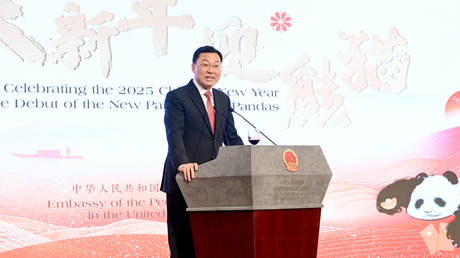 Chinese envoy calls Trump tariffs an ‘echo of Great Depression’
Chinese envoy calls Trump tariffs an ‘echo of Great Depression’
The Wall Street Journal reported last week, citing unnamed sources, that the Trump administration aims to use tariff negotiations to pressure US trading partners to limit ties with China.
The plan reportedly involves blocking Chinese goods from transiting through their countries, preventing Chinese firms from relocating to avoid US duties, and rejecting cheap Chinese industrial imports.
Trump has not officially stated he would pressure countries to curb trade with China, but the president has suggested openness to the idea.
“Maybe, yeah, maybe,” Trump told Fox News last week, when he was asked whether Latin American countries should be forced to choose between Chinese and US investment. “They should do that.”
Since the escalation of trade tensions with the US, China has been actively strengthening its ties with other countries, engaging with officials from the EU, Japan, and South Korea. Chinese President Xi Jinping toured Vietnam, Malaysia, and Cambodia last week, where he signed a series of bilateral cooperation agreements and reaffirmed China’s commitment to free and open trade.
“The fact is, nobody wants to pick a side,” Bo Zhengyuan, partner at China-based policy consultancy Plenum told NBC News.
“If countries have high reliance on China in terms of investment, industrial infrastructure, technology know-how and consumption, I don’t think they’ll be buying into US demands. Many Southeast Asian countries belong to this category,” he added.
-
Site: Ron Paul Institute - Featured Articles
In 1997, veteran U.S. diplomat George Kennan stated that ‘expanding NATO would be the most fateful error of American foreign policy in the entire post-Cold War era’. Twenty-eight years later, who would say he was wrong?
George Kennan famously authored the U.S. policy of containment of the Soviet Union, in an article in the New York Times of 1947, which he signed X, to maintain his anonymity. His view was that containment would lead to the eventual break up or mellowing of Soviet power and, as it turns out, the former prediction came to pass.
Yet, he was opposed to the expansion of NATO after the collapse of the Soviet Union and argued that asking European nations to choose between NATO and Russia would eventually lead to conflict.
In an article in the New York Times of 5 February 1997 he asked: ‘Why, with all the hopeful possibilities engendered by the end of the cold war, should East-West relations become centred on the question of who would be allied with whom and, by implication, against whom in some fanciful, totally unforeseeable and most improbable future military conflict?’
His article was intended to influence discussions ahead of the July 1997 NATO Summit in Madrid which would consider the planned expansion of NATO to include the Czech Republic, Hungary, Poland, and Slovakia. Each state had suffered under Soviet repression after World War II but were now free and democratic after the dissolution of the Warsaw Pact.
Kennan’s warning went unheeded, the NATO Summit agreed to the inclusion of three of the four former Warsaw Pact countries within NATO, excluding Slovakia which had not received the required number of votes in a referendum.
On 1 May 1998, the U.S. Senate passed a resolution approving expansion, as every NATO member state is required to do. After the Senate Resolution, then President Clinton said at the White House, ”by admitting Poland, Hungary and the Czech Republic, we come even closer than ever to realizing a dream of a generation – a Europe that is united, democratic and secure for the first time since the rise of nation-states on the European continent.’
The idea then, which continues today, is that NATO is a military alliance of countries with the same democratic principles acting as a bulwark against military aggression, by implication, from Russia. Yet, Kennan seemed to consider absurd the idea – which peppers political and media discourse still today – that Russia aspires to conquer western Europe by military means.
In a separate New York Times article on 2 May 1998, the day after the U.S. Senate resolution, Kennan said, ‘I was particularly bothered by the references to Russia as a country dying to attack Western Europe. Don’t people understand? Our differences in the cold war were with the Soviet Communist regime. And now we are turning our backs on the very people who mounted the greatest bloodless revolution in history to remove that Soviet regime.’
In his 1997 article, Kennan went on to say that Russia would ‘have no choice but to accept [NATO] expansion as a military fait accompli. But they would continue to regard it as a rebuff by the West and would likely look elsewhere for guarantees of a secure and hopeful future for themselves.’
Russia did accept the expansion of NATO as a fait accompli, in part because she was too weak to resist. In 1998, the Russian Federation was possibly at its lowest point after the collapse of the Soviet Union. On 17 August 1998, Russia defaulted on its sovereign debt and devalued the rouble. In visibly declining health, President Yeltsin cut an increasingly weak and erratic figure on the world stage. The billionaire oligarch class had built an outsized role in Russian politics, having swept up state assets under the Loans for Shares scheme, and having bankrolled Yeltsin’s 1996 election success, for their own personal gain. Russia was politically, economically and militarily weak, and internally distracted by a costly war in Chechnya. It was by no measure comparable to the fearsome might of the Soviet Union, or a threat to NATO. Indeed, tentatively, and in ways that were sometimes strained, Russia and NATO ended up collaborating, including in Kosovo in 1999.
The next crunch point came after the terrorist attacks in New York and Washington DC on 11 September 2001.
President Putin was one of the first world leaders to phone President Bush to express his condolences to the president and to the American people and offer his unequivocal support for whatever reactions the American president might decide to take. This led quite quickly to a period of U.S.-Russia cooperation, including concrete Russian assistance to the U.S. campaign in Afghanistan and acquiescence to the establishment of U.S. bases in Central Asia.
Michael McFaul, who is now one of the most vocal anti-Russia hawks, wrote an article for the Carnegie Endowment, saying that ‘the potential to build a new foundation for Russia-American relations is great.’ He advanced a radical agenda, starting with a declaration that ‘the United States no longer recognizes Russia as the successor state to the Soviet Union.’ In substantive terms, this meant a repudiation of the idea that Russia represented a threat to NATO in the way that the Soviet Union had.
McFaul proposed deeper Russia-NATO collaboration and possible future Russian membership, which President Putin had shown a willingness to consider. He also recommended other measures, including removing Soviet era trade restrictions, lifting a ban on NATO countries buying Russian weapons and encouraging a closer relationship between Russia and the EU.
However, one week after McFaul’s article, the Brookings Institution wrote an article, raising a red flag against any departure from U.S. engagement on across the globe as a concession to the new ‘war on terror.’ Among other things, it pointed out that ‘the new premium on Russian cooperation.. might make it harder or more costly for Washington to proceed with current policy plans to withdraw from the Anti-Ballistic Missile (ABM) treaty, enlarge NATO, or press for human rights in Chechnya.
Deepening Russian-American collaboration immediately ran up against the separate juggernaut of NATO expansion which had continued to gather pace after the 1998. Nine other former Soviet or Warsaw Pact countries were already waiting in the wings to join NATO, and a comprehensive reboot of relations with Russia would have made expansion more difficult. In the teeth of Russian concern about the U.S. invasion of Iraq in 2003, and western concern about President Putin’s clampdown on the oligarchs, U.S.-Russia collaboration lost steam and NATO pressed on regardless. Seven new Members joined the military alliance in 2004, including the Baltic States, Bulgaria, Romania, Slovakia and Slovenia, bringing NATO much closer to Russia’s border.
In his 5 February 1997 article, Kennan said that NATO expansion ‘may be expected to inflame the nationalistic, anti-Western and militaristic tendencies in Russian opinion; to have an adverse effect on the development of Russian democracy; to restore the atmosphere of the cold war to East-West relations, and to impel Russian foreign policy in directions decidedly not to our liking.’
Ten years later, on 10 February 2007, President Putin made his now famous speech at the Munich Security Conference, in which he said, ‘I think it is obvious that NATO expansion does not have any relation with the modernisation of the Alliance itself or with ensuring security in Europe. On the contrary, it represents a serious provocation that reduces the level of mutual trust. And we have the right to ask: against whom is this expansion intended?’
The following year at the 2008 NATO Bucharest summit, nonetheless advanced the idea of Georgia and Ukraine joining NATO one day. President Putin, who joined part of the Summit, conceded in his speech that he could not veto NATO expansion. But he went on to asset that ‘if we introduce [Ukraine] into NATO.. it may put the state on the verge of its existence. Complicated internal political problems are taking place there. We should act.. very-very carefully.’
His views were again ignored, and the idea of Georgian and Ukrainian membership of NATO was set in train with the consequences that we see today.
However, a central truth of NATO expansion towards Ukraine, visible to me in 2013 when I first started to focus on Russia, is that western powers have never committed to fighting for Ukraine’s right to join. This is exactly the point that George Kennan acknowledge in his 1998 comments. He said, ‘we have signed up to protect a whole series of countries, even though we have neither the resources nor the intention to do so in any serious way.’
Looking at Ukraine today, with its de facto exclusion from NATO membership, denied the deployment of U.S. military force to support for its war effort and practically bankrupt from the slow depletion of western financial support, who would say that Kennan was wrong, 28 years ago?
The 1998 New York Times article in which Kennan was widely quoted also noted that ‘future historians will surely remark upon the utter poverty of imagination that characterized U.S. foreign policy in the late 1990’s’. History would surely judge western foreign policy since 2013 more harshly still.
Reprinted with permission from Strategic Culture Foundation.
-
Site: Ron Paul Institute - Featured Articles
Those who hoped the second Trump Administration would reject big spending, war, and restrictions on liberty continue to be disappointed. A new disappointment came when Department of Homeland Security Secretary Kristi Noem announced her department would in May begin enforcing the REAL ID law.
Passed in 2005, the REAL ID Act created federal standards for driver’s licenses. The law requires everyone applying for a driver’s license to provide the DMV with his social security number, proof of legal residence, and two proofs of his home address. The REAL ID Act allows the Homeland Security Department to mandate, as it sees fit, the including of addition items in the related government database, including “biometric” identifiers. Biometric identifiers include personal data such as retina scans, fingerprints, and DNA.
People who doubt that this database will be used to violate the rights of US citizens should ask what a present-day J. Edgar Hoover — a former FBI director who was notorious for collecting private information on politicians and other prominent individuals — would do with a database containing personal and even biometric information on American citizens. They should also consider the IRS’s history of targeting presidents’ political opponents. Americans also have the threat of violations of their rights by hackers. The government has a poor track record of protecting data of US citizens.
REAL ID’s supporters deny the law turns state driver’s licenses into national ID cards because states have no mandate to implement REAL ID. However, citizens of any state that refuses to adopt REAL ID will be unable to use their state-issued IDs for boarding an airplane or riding on a train.
Once the initial uses of REAL ID are established, the government will then require REAL ID for other activities. For instance, local transportation authorities may be offered federal funds to implement REAL ID requirements for public transportation. Several pro-Second Amendment organizations oppose REAL ID because it could be used to monitor gun owners. There is nothing in the law prohibiting a future progressive Homeland Security secretary from requiring REAL ID for a firearms purchase. Imposing a REAL ID mandate on gun ownership would further the authoritarian objective of having a database containing the name and address of, and how many and what type of firearms are owned by, every law-abiding gun owner in the country.
REAL ID also menaces health freedom. One of the few victories for liberty during the covid hysteria was the failure of “vaccine passport” schemes to be more widely imposed. These schemes attempted to forbid people from returning to their normal lives unless they proved they were “fully vaccinated” against covid.
REAL ID was marketed as a weapon in the “war on terror.” However, Thomas Massie, the most consistent and courageous defender of liberty in the House of Representatives, pointed out that 9-11 hijackers used passports from their own countries. Rep. Massie wrote, “As long as the pilot’s door is locked and no one has weapons, why do you care that someone who flies has government permission?”
Like most post-9-11 security bills, REAL ID does nothing to protect the American people’s safety. It does, though, do much to endanger their liberty. REAL ID could even be the final piece of the transformation of America into a total surveillance society where government monitors, and thus controls, our actions. Americans who understand the danger must work to get the Trump administration to reverse its position.

